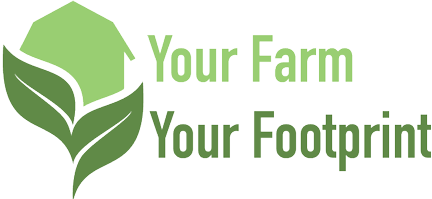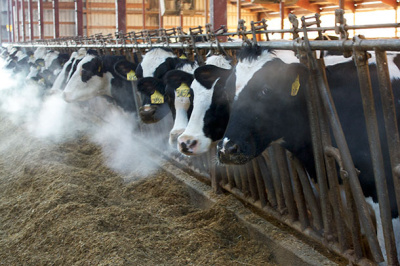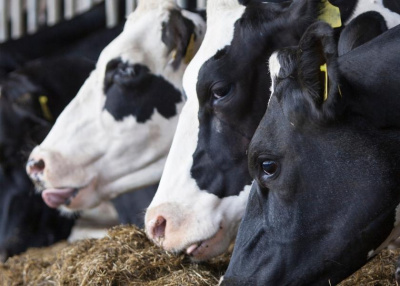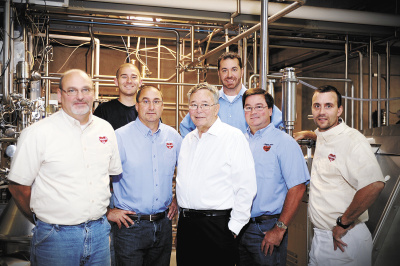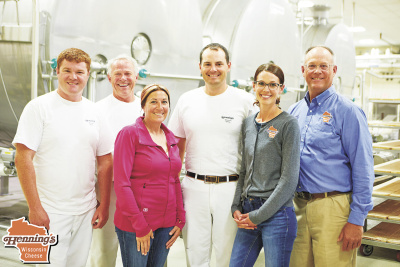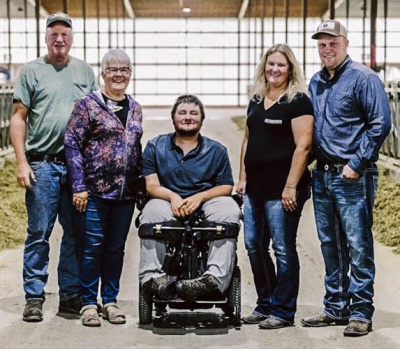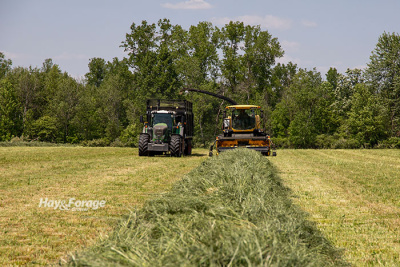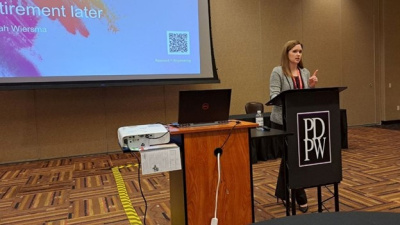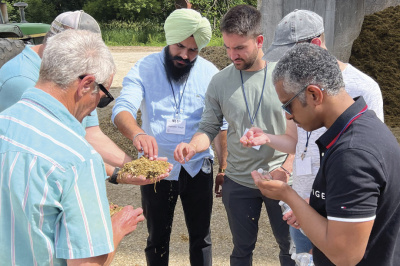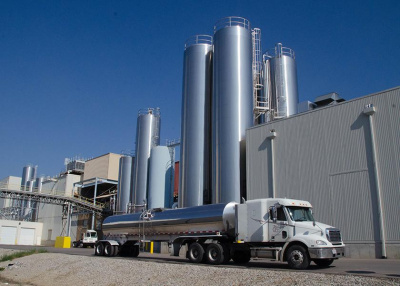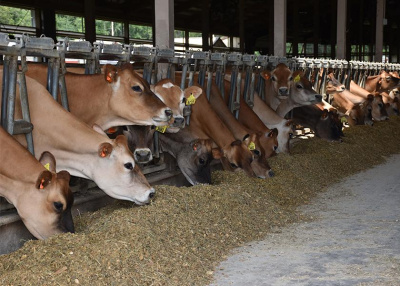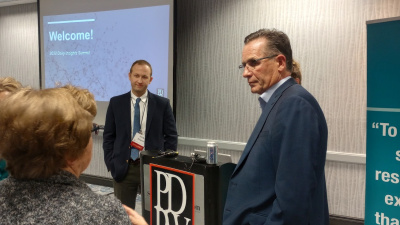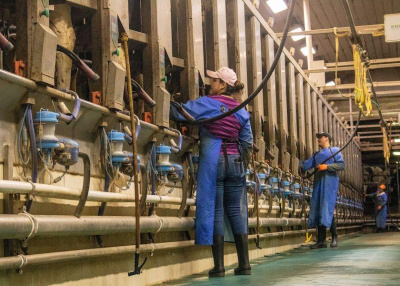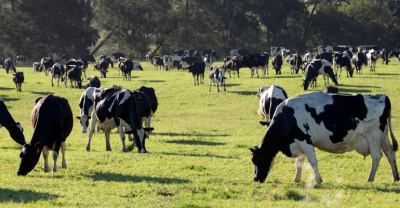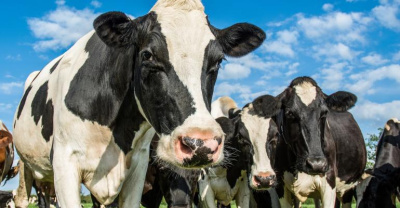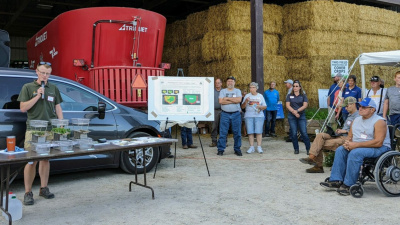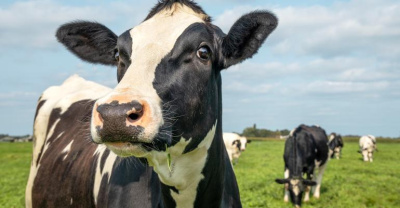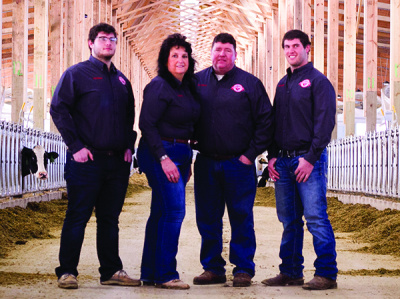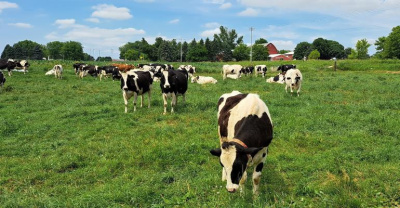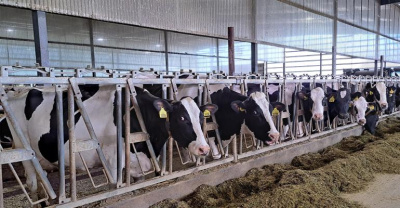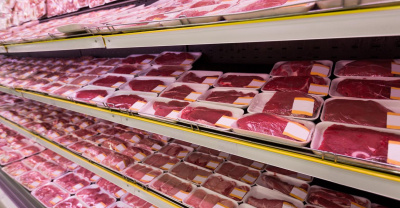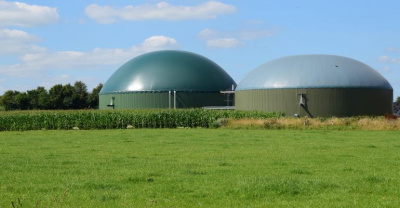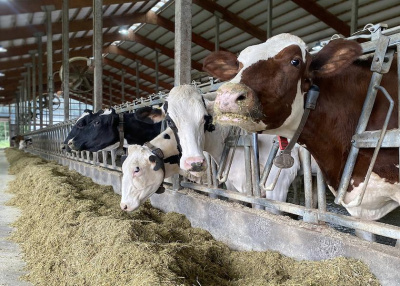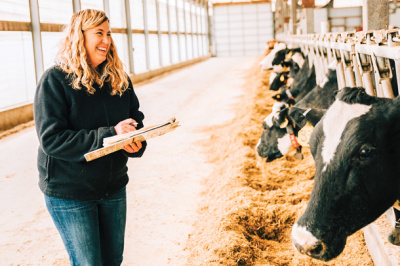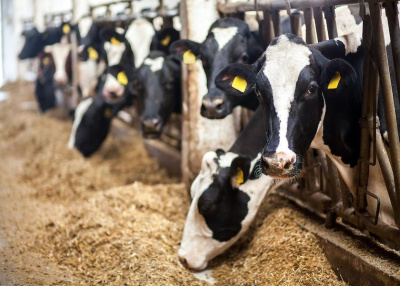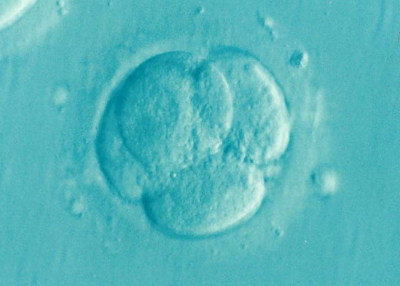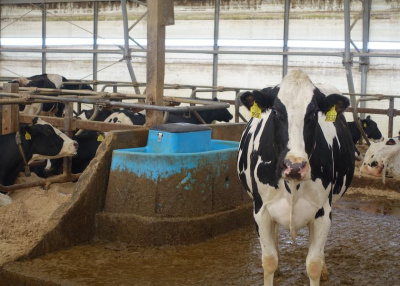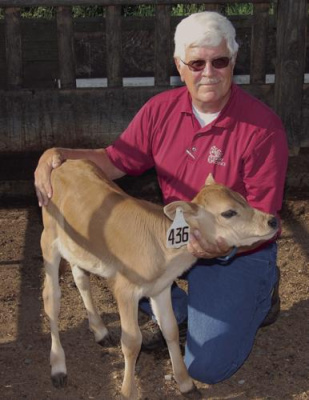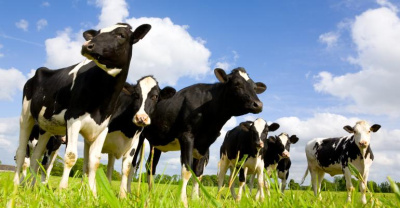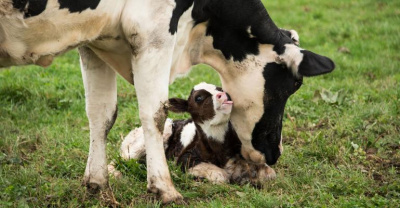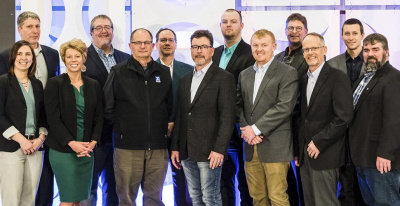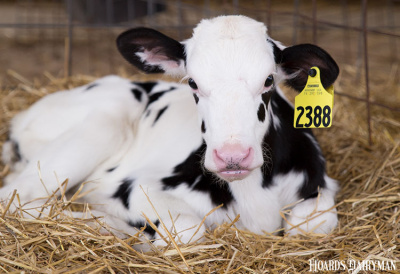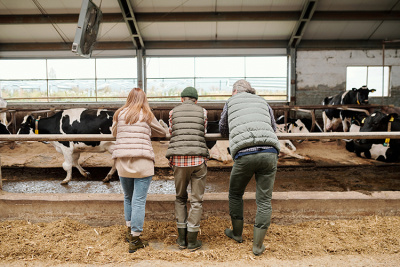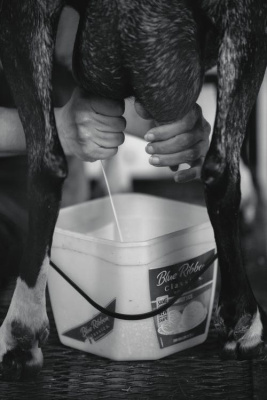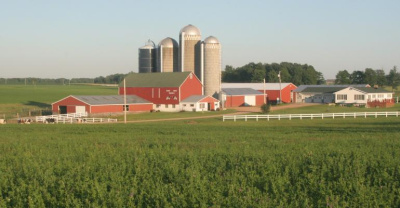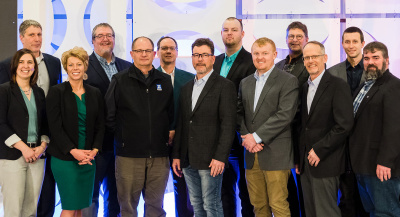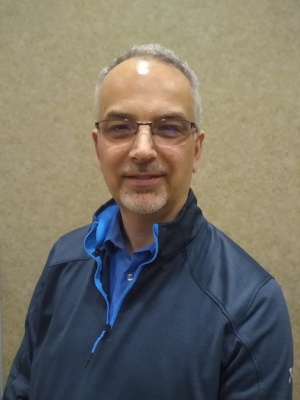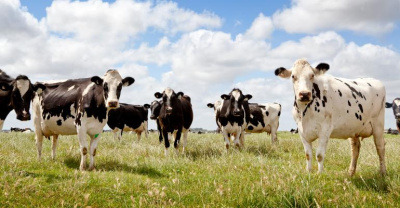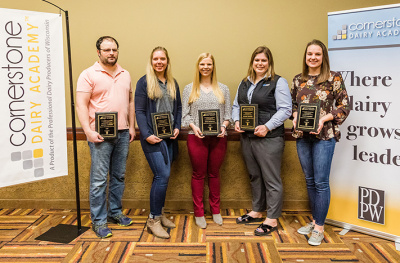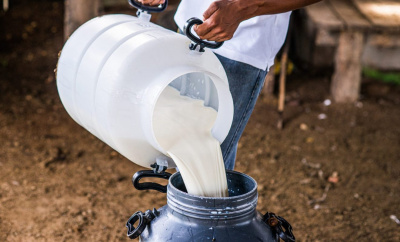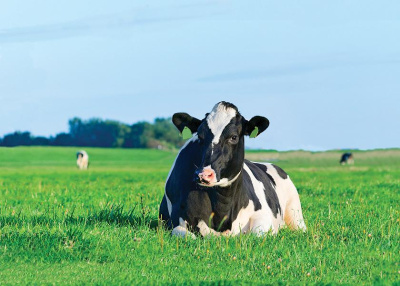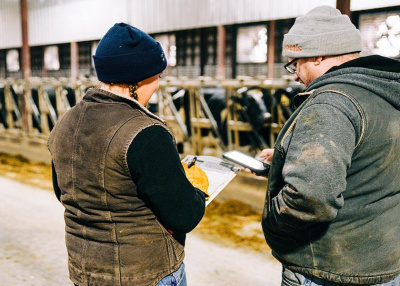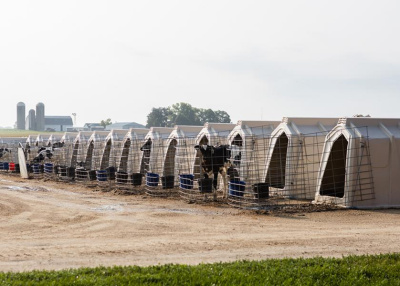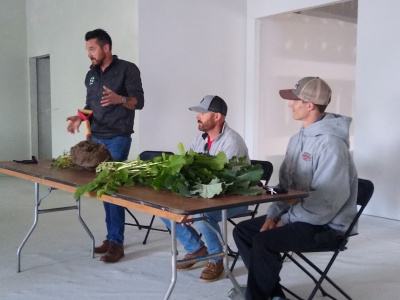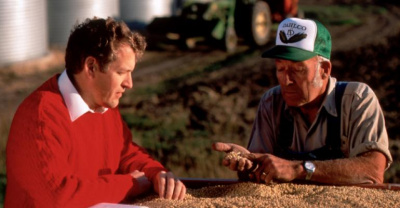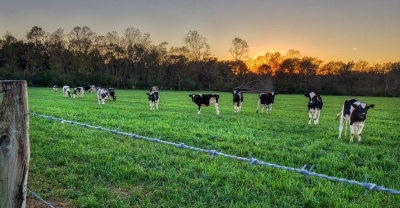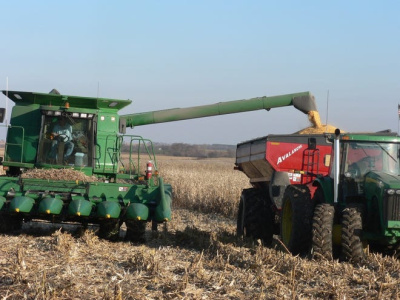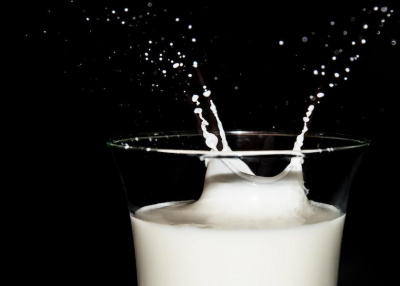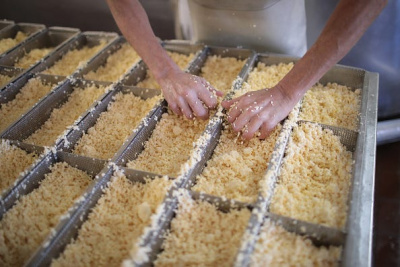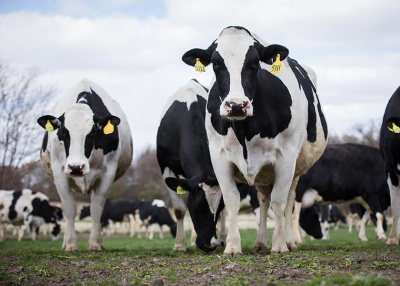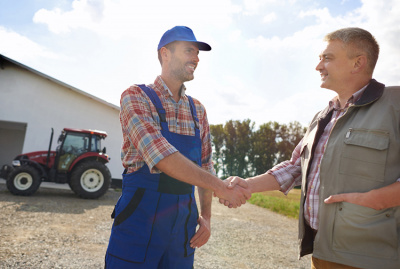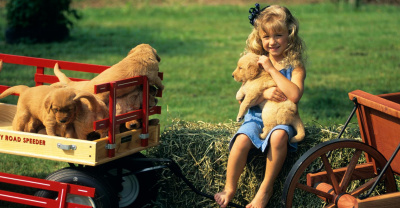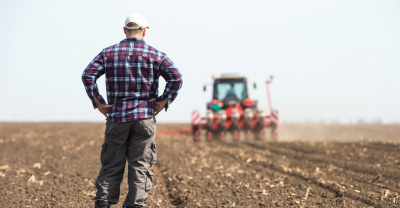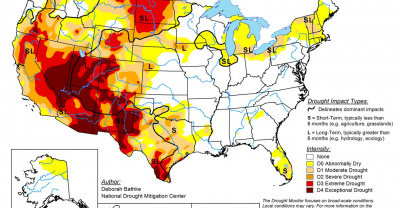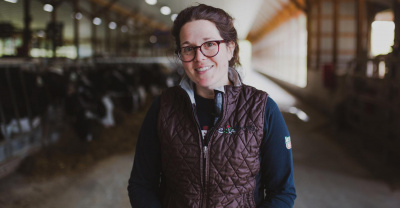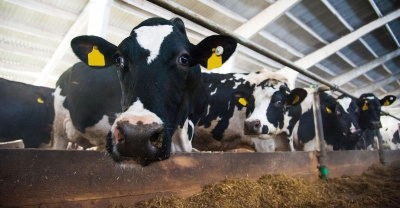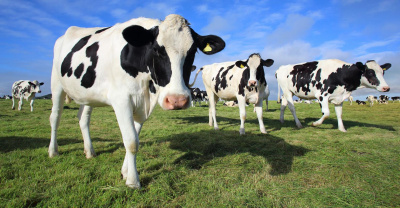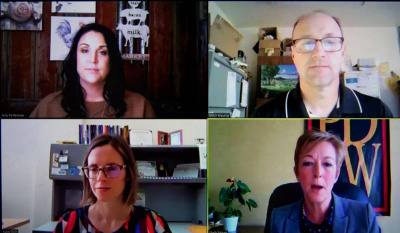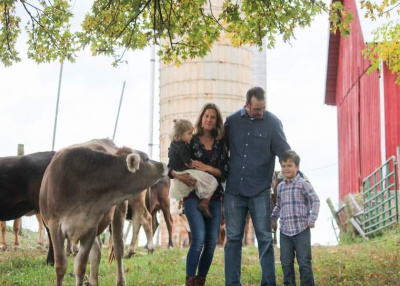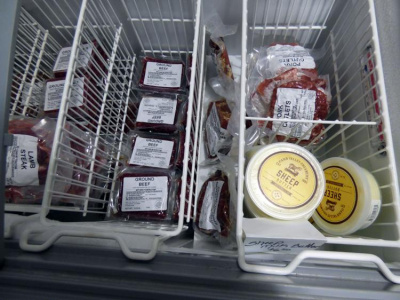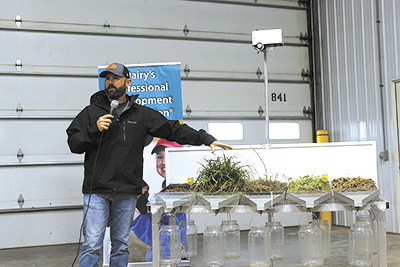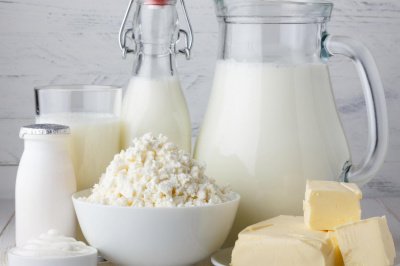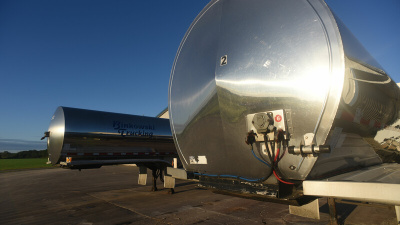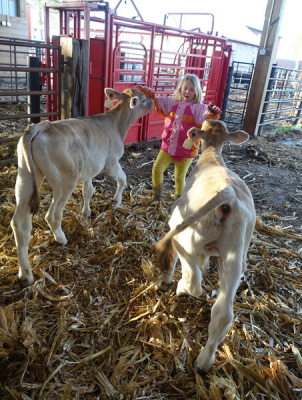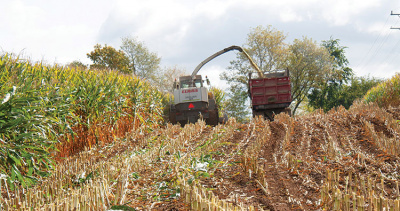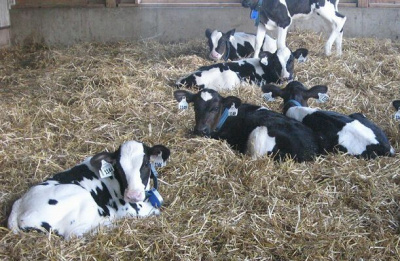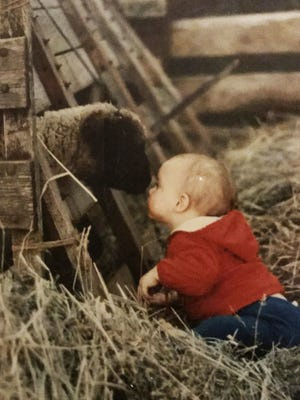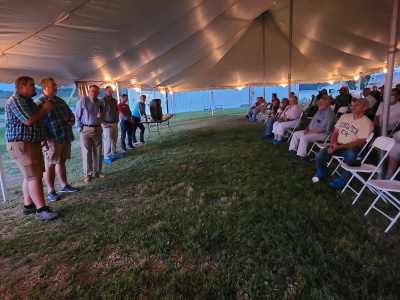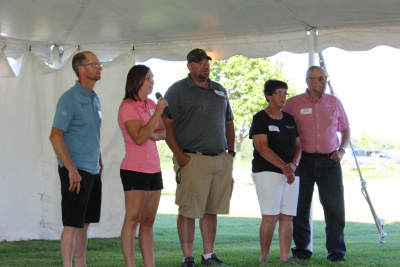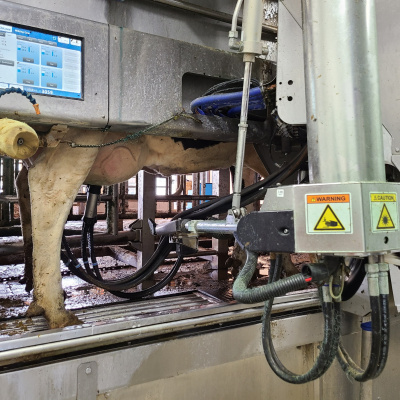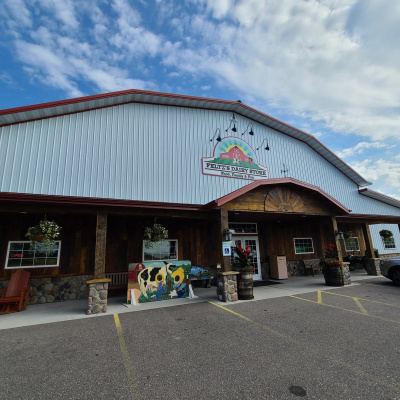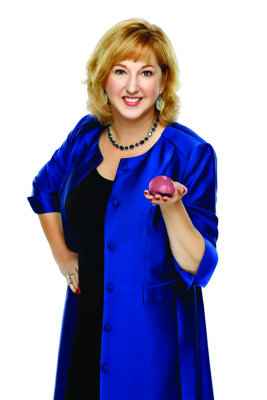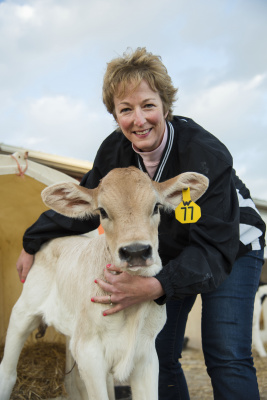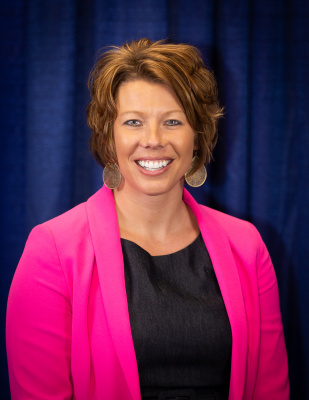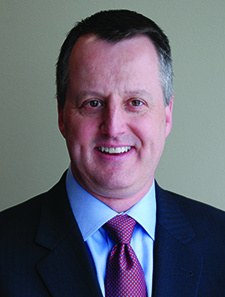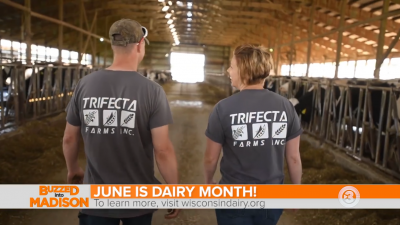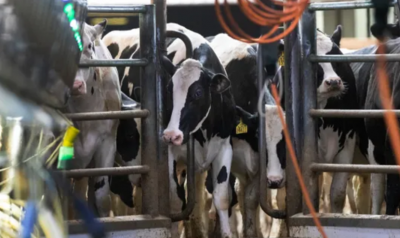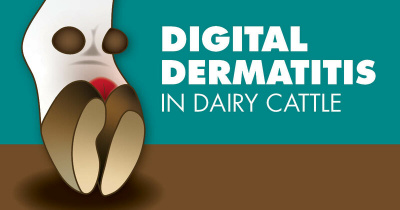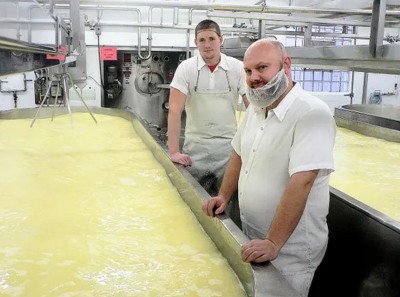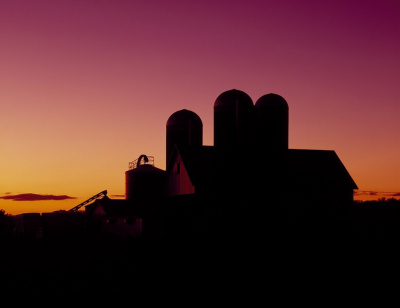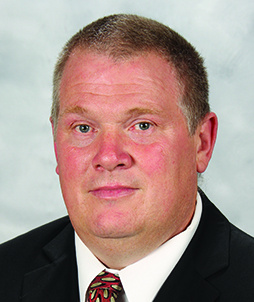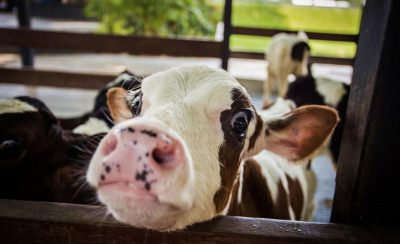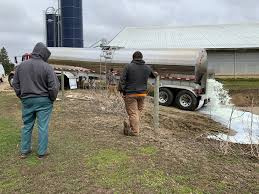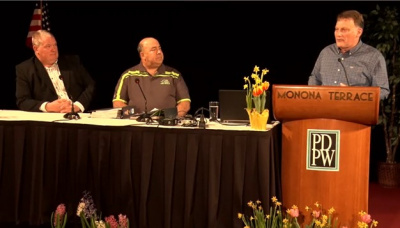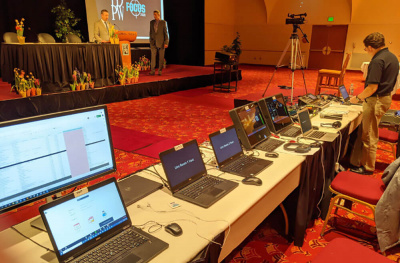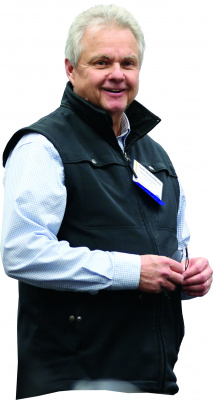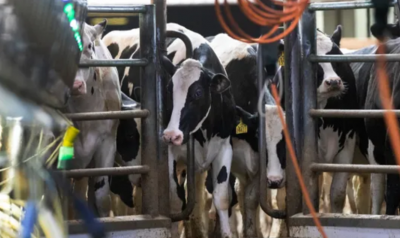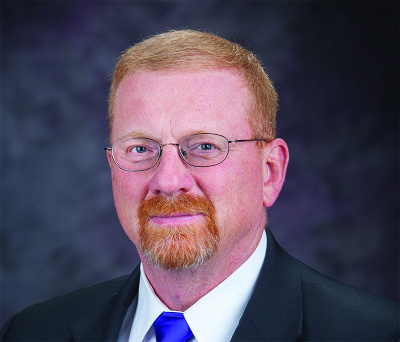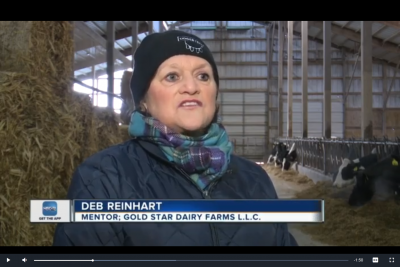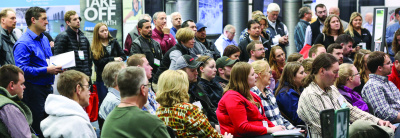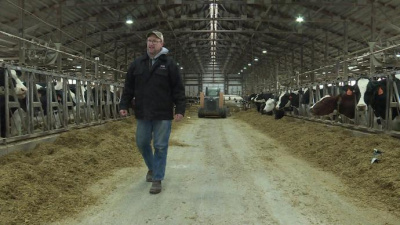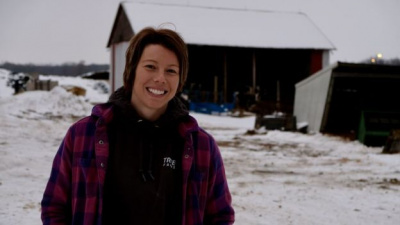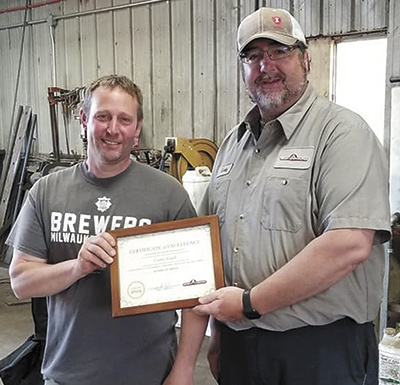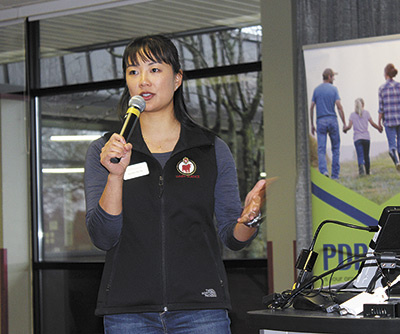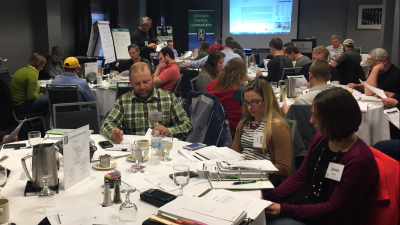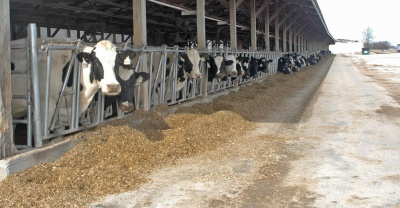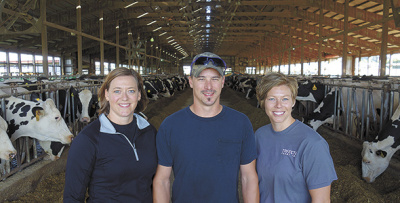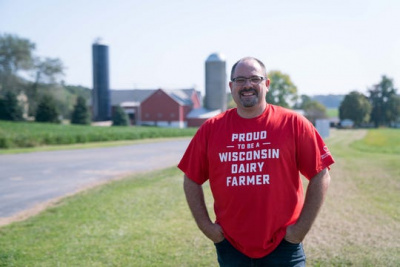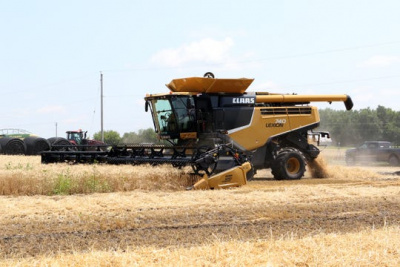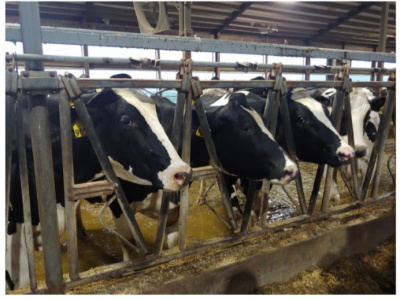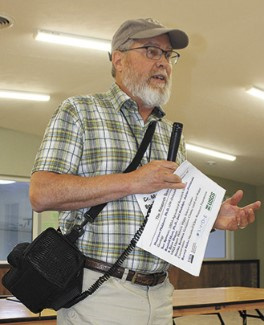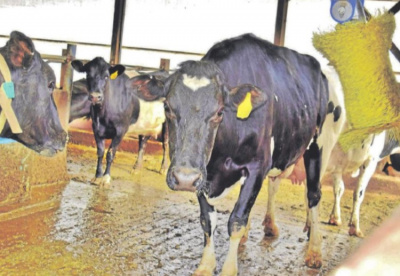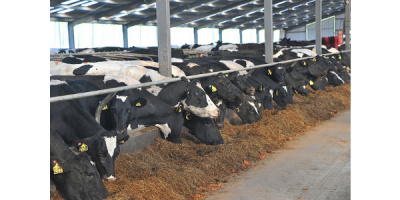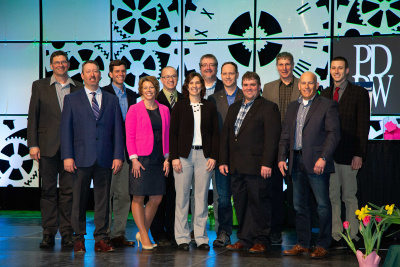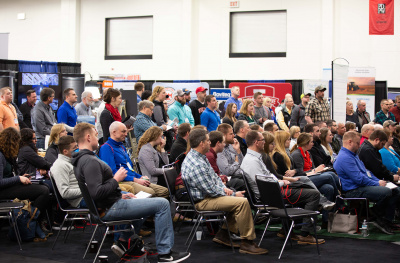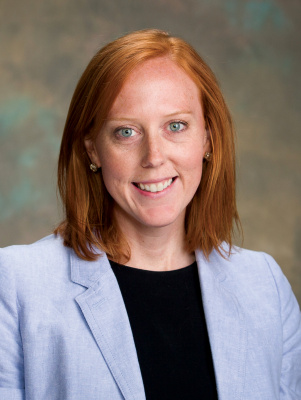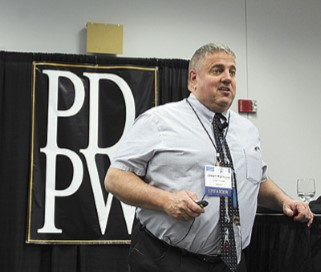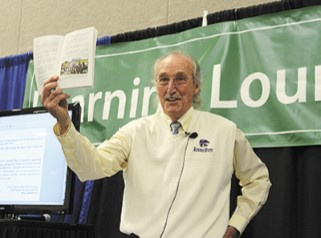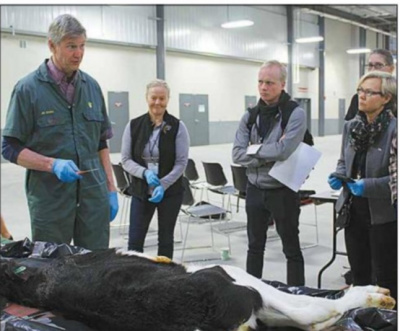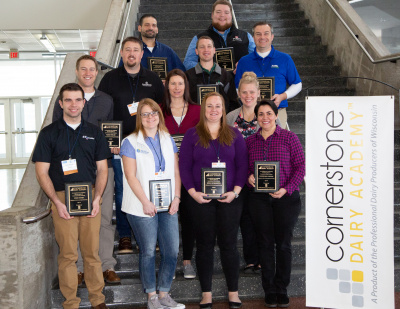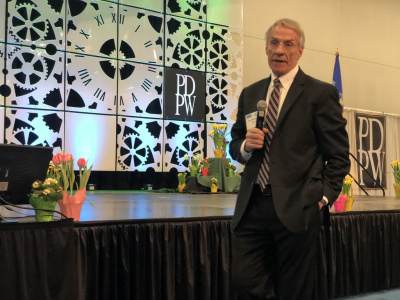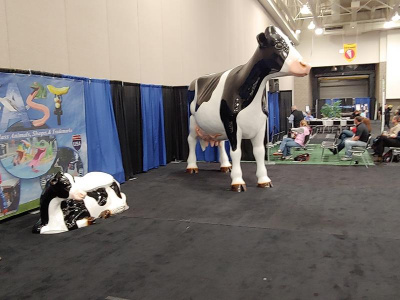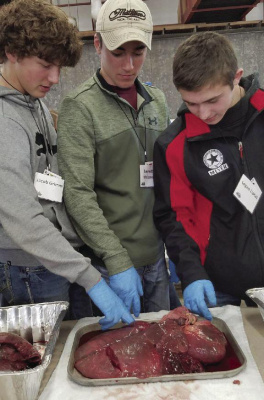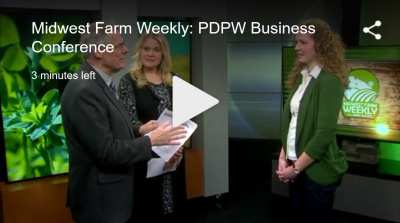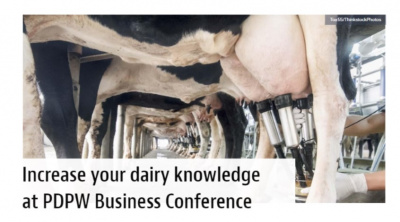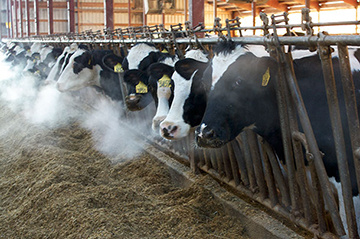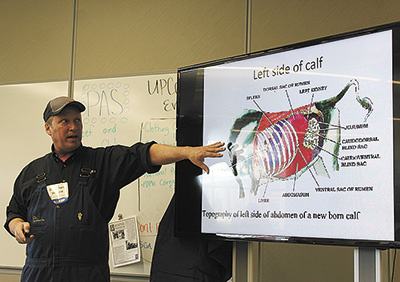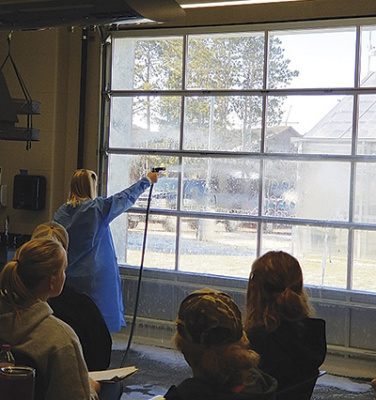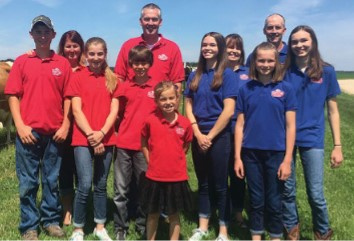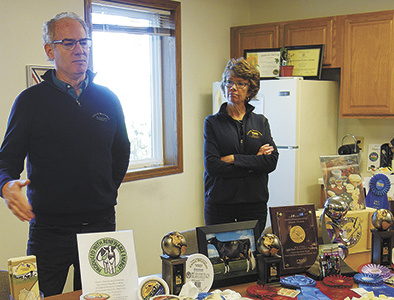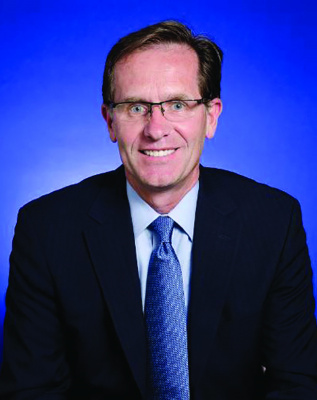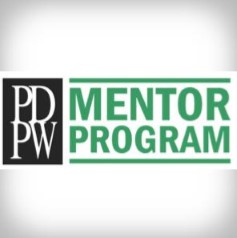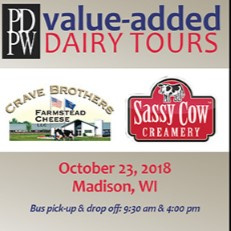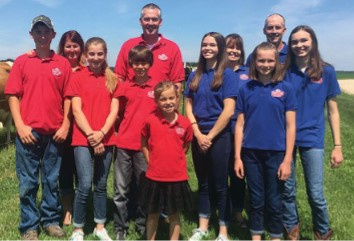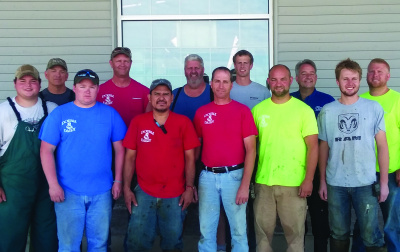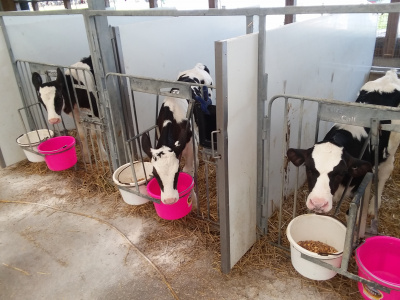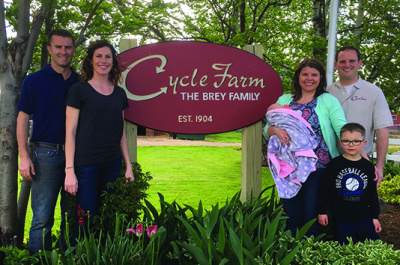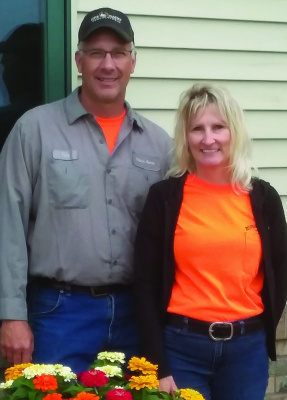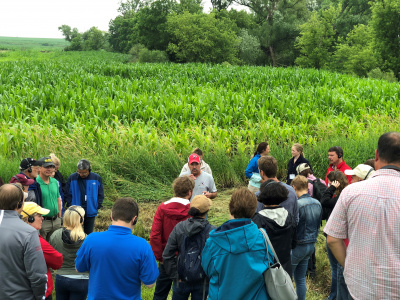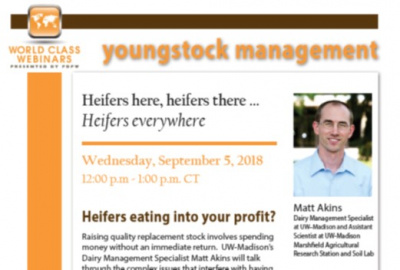A group of state lawmakers is working to help Wisconsin’s struggling dairy industry, by focusing on our research universities. Agriculture is an $88 billion industry. Half of that comes from dairy farms. But in the past 15 years, Wisconsin has lost half its dairy herds. The state has 750 fewer this year than at the same time last year. “The problem is, for the last five years, our farmers haven’t been able to pay their bills,” said state Rep. Travis Tranel.
PDP Makes the News
Posted November 26th, 2024
According to Courtney Halbach, University of Wisconsin Extension Dairyland Initiative outreach specialist, now is a great time to make sure the ventilation systems in your dairy and calf facilities are in good working order.
Posted August 1st, 2024
As dairy farmers, we have a unique way of life and a distinct responsibility to share the stories of our farm and industry with our communities.
Posted June 18th, 2024
Just because a fresh cow tests over the standard threshold typically used to screen for ketosis doesn’t necessarily mean she’s sick. She might be just fine and even rocking and rolling into lactation, according to two University of Minnesota researchers who have studied ketosis extensively.
Posted May 28th, 2024
If you love dairy products but struggle with digestive issues, there are still ways to enjoy many dairy foods.
Posted April 2nd, 2024
You can’t escape hearing about carbon markets, as they are becoming more complex. With the mission to become carbon neutral by 2050 the dairy industry is passionately committed to better caring for their environment. This is resulting in more conversations on capturing dairy’s carbon footprint.
Posted December 9th, 2023
APPLETON, Wis. — As one of the few remaining milk bottling plants in Wisconsin, Lamers Dairy is committed to quality and freshness as well as creating a product with a long shelf life. The company currently processes milk from five local farms as it continues a family tradition started in 1913.
Posted November 25th, 2023
KIEL, Wis. — For more than a century, Henning’s Cheese has made award-winning artisan and specialty cheese from the fresh milk of local, small family farms. Through their steadfast devotion to the dairy farmer, four generations of the Henning family have carved a niche in the industry.
Posted September 18th, 2023
Buckle up! Milk prices, along with nearly all commodities, are expected to be volatile through the rest of 2023 and into 2024, according to Ben Buckner, dairy and crops analyst for AgResource Co. Buckner spoke during a recent Professional Dairy Producers Dairy Signal webinar.
Posted September 11th, 2023
DEER PARK, Wis. – One of Minglewood Inc.’s core values is being innovative and applying new ideas. That’s evidenced by a variety of new technologies at the 1,200-cow dairy farm near Deer Park.
“We’ve invested a lot (in technology) in the past year,” said Kristin Quist of her family’s dairy farm. “We’re not usually on the ‘bleeding edge’ – more like the ‘leading edge’ – but the technologies are great assets to our farm.”
Posted September 8th, 2023
Despite high prices, consumer demand for beef continues to be strong, according to Mike Simone, executive director of market research and intelligence for the National Cattlemen’s Beef Association, and Brandon Scholz, president and CEO of the Wisconsin Grocers Association. The two spoke recently during a Professional Dairy Producers Dairy Signal webinar.
Posted July 4th, 2023
In many cases, alfalfa tends to take the cake when it comes to a farmer’s favorite forage. Among its heralded characteristics are a high crude protein content, perennial ground cover to reduce erosion, and the ability to fix nitrogen in the soil.
Posted May 19th, 2023
According to Sarah Wiersma, planning for retirement is often seen as something to consider later in life, but the sooner you start, the better. Regardless of your age, if you haven’t started planning yet, it’s not too late. Wiersma spoke recently during a Professional Dairy Producers conference at Wisconsin Dells, Wis.
Posted May 15th, 2023
Economist Dan Basse believes milk prices are near a seasonal low for 2023 and by the end of June, prices will start heading up again. Basse, president of AgResource Co. in Chicago, said during a May 11 Professional Dairy Producers Dairy Signal webinar that the Class III milk price was $16.40 per cwt.
Posted April 3rd, 2023
Countless tasks demand the attention of dairy producers – immediate and long term. It can be easy to overlook the role education plays in successfully managing a dairy business.
When Professional Dairy Producers (PDPW) was founded over 30 years ago, the organizers faced a widespread mentality of hopelessness in the Midwest dairy community. Despite what looked like an uphill battle, leaders of the fledgling producer-led organization understood that well-vetted education would be central to the dairy industry’s success.
Posted March 29th, 2023
Warren Buffet is seen by some as being the best stock-picker in the world and one of his most famous sayings is, “Rule No. 1: Never lose money. Rule No. 2, don’t forget Rule No. 1.” Dr. Brady Brewer with the Department of Agriculture Economics at Purdue University shared with the PDPW audience earlier this month that it is unlikely that Buffet spends much time working in agriculture’s volatile up-and-down market.
“Sometimes that makes it hard to manage our finances,” he says.
Posted March 28th, 2023
Keynote speakers Dan Basse, president of AgResource Co., and Jacob Shapiro, partner and director of Cognitive Investments, provided insights and analysis of the economic, geopolitical and market factors impacting the dairy industry during the opening session of the Professional Dairy Producers Business Conference at the Kalahari Resorts in Wisconsin Dells on March 15.
Posted March 20th, 2023
The rollercoaster of the dairy industry certainly isn’t new. History illustrates the constant up and down cycle and shows the need for strong global markets. However, Jacob Shapiro, a partner and director of geopolitical analysis for Cognitive Investments (CI) shared at the PDPW Business Conference in the Wisconsin Dells that down the road, there won’t be one global market for producers to sell into. Instead, numerous potential trade markets will be the way of the future.
Posted February 2nd, 2023
Farmers have a laundry list of things to do each day. Care for the cows, call the feed mill, shuffle through the paperwork. The list goes on and on, and at the end of the day, there may only be a few hours left to eat dinner, talk with loved ones and take a hot shower before doing it all again the next day.
Posted December 7th, 2022
A global commodities marketing expert is concerned about the number of acres used to produce food. Dan Basse with AgResource Company says the rapidly-growing world population will need land for growing food. “This is a really big deal because if I need more acres to feed that ever-expanding world. We added a billion people in twelve years to the global population. The next billion happens in eight and a half, so where does the food supply come from?”
Posted December 6th, 2022
From rural small towns to the bustling big city, help wanted signs have been hung in nearly every business window. Dairy farmers are no strangers to the pain of labor shortages. This has been a problem on their plates for the last decade. However, what makes this pressing issue even worse is a tighter, more competitive labor market. And unfortunately, this appears to be a trend with no foreseeable end in sight.
Posted November 21st, 2022
Dairy Outlook: Grain and dairy analyst says strong milk prices will continue, while feed prices are expected to be lower next year.
According to Ben Buckner, chief grain and dairy analyst at AgResource Co., dairy producers will see lower feed prices in 2023 and continued strong milk prices. He credits high domestic consumption of dairy products, strong dairy exports and no increase in the U.S. dairy herd size.
Posted September 19th, 2022
Dairy Outlook: High grocery prices have Americans flocking to fast food restaurants.
According to Dan Basse, president of AgResource Co., Americans are now spending more of their food dollars eating away from home than at home. Basse spoke during a recent Professional Dairy Producers Dairy Signal webinar.
Posted September 7th, 2022
On August 4, Glenda Gillaspy assumed the role as Dean of the College of Agricultural and Life Sciences at UW–Madison. She came to Wisconsin from Virginia Tech, where she was a professor of biochemistry since 1998 and head of the department since 2015.
The Hub invited Dean Gillaspy to Sauk City, Wis. on August 24, where she met Hub stakeholders and advisory council members at Mystic Valley Dairy. Representatives from Dairy Business Association, Dairy Farmers of Wisconsin, Cooperative Network, the Department of Agriculture, Trade and Consumer Protection, Farm First Cooperative, Professional Dairy Producers of Wisconsin, UW–Madison, Wisconsin Farmers Union and more attended the event. Dean Gillaspy, stakeholders, and advisory council members were given a tour of Mystic Valley Dairy farm, led by owner and Hub council chairman Mitch Breunig.
Posted September 6th, 2022
Pheasants Forever isn’t just about hunting. And Professional Dairy Producers of Wisconsin isn’t just about milking cows. Recently these two organizations have developed a partnership, promoting on farm conservation and sustainability practices that also make sense to a farmers bottom line.
Posted July 27th, 2022
A lot of focus gets put on calf care, but according to Matt Atkins, University of Wisconsin Extension dairy management specialist at the Marshfield Ag Research Station, the growth of a heifer from post-weaning to calving has a lot of influence on a dairy cow’s future performance.
Posted July 18th, 2022
After chores are completed, farmers, elected officials, community members and mroe are invited to visit one of four farms across Wisconsin and engage in meaningful dialogue and learn more about their rural neighbors during the 2022 Agricultural Community Engagement (ACE) Twilight meetings hosted by dairy farms in Vernon, Buffalo, Clark and Dodge counites.
Each meeting starts with a dairy tour at 6 p.m.. Ice cream will be served at 7 p.m. with discussion following until 8:30 p.m. The meetings are set from Aug. 29 - Sept/ 1.
Posted July 18th, 2022
Investor confidence was shaken when the Federal Reserve began raising interest rates, according to a grain and dairy analyst.
“Markets worldwide continue to reel from a lack of free money,” said Ben Buckner, with AgResource Co., during a recent Professional Dairy Producers Dairy Signal webinar
Posted June 20th, 2022
Milk supply issues continue across the U.S. and the world, with no indication the supply problem will be solved anytime soon, reported a dairy analyst during a recent Dairy Signal webinar by the Professional Dairy Producers.
“We’re still looking for a price that keeps milk stocks adequate and somehow allows the supply to expand,” said Ben Buckner, chief grains and dairy analyst for AgResource Co. “I don’t think we have found that price yet.”
Buckner noted that many economists believe the world is on the cusp of a global food crisis. “There just isn’t any room for a yield error in any major grain-producing area,” he said.
Posted June 3rd, 2022
Grilling season has begun, and with summer officially underway, it is notable that beef sales and features are largely absent at the retail level.
Wholesale beef prices are lower than this time last year and have come off the record highs seen at the beginning of the year, but lower prices have not reached the consumer.
In speaking on the May 31 Professional Dairy Producers of Wisconsin Dairy Signal broadcast, Steve Van Lannen, President and COO of American Foods Group, said that “retailers have really good margins right now and they seem to be satisfied with maintaining margin more than increasing volume.”
Posted May 26th, 2022
Patrick Wood, general manager of Ag Methane Advisors, believes financial incentives are necessary for dairy farms to implement new advanced technologies and best management practices to reduce greenhouse gas emissions.
“Our mission is to help farmers get paid for reducing their greenhouse gas emissions and improving their environmental performance,” Wood said during a Professional Dairy Producers webinar about participating in carbon markets. “We think carbon markets have been and will continue to be a great way to do that.”
Posted May 26th, 2022
Small changes in managing and feeding cows can make a big impact in a dairy’s milk check. Feed quality and timing, stocking density and feeding supplements are some areas that can impact component levels in milk and deliver a better return on a dairy’s feed investment.
Posted May 25th, 2022
“A picture is worth a thousand words.”
If that familiar saying is true, I can only imagine the number of words an in-person tour experience is worth. A whole book, perhaps? I’d venture to say that it’s especially true in the dairy industry.
Posted May 18th, 2022
It’s a brave new world in agriculture, and that includes the U.S. dairy industry.
As a result, “dairy” farms are becoming a thing of the past, according to Marin Bozic, Assistant Professor in Dairy Foods Marketing Economics at the University of Minnesota. He shared his thoughts on the future of the dairy industry with the audience of the recent 2022 Annual Conference of the Professional Dairy Producers of Wisconsin.
Posted May 11th, 2022
Farming is an extremely demanding and time-consuming job, which makes it challenging to maintain balance between a personal and professional life.
Two young Wisconsin dairy farmers had the opportunity to share advice on balancing the many obligations of business and family during a recent Dairy Signal webinar hosted by Professional Dairy Producers of Wisconsin.
Posted May 5th, 2022
Embryo transfer can be a great tool to maximize a cow’s reproductive efficiency. Not only does it allow her to have multiple calves per year, but in can also boost the amount of offspring she has throughout her lifetime.
The technology, however, can be costly -- especially if the embryos do not survive.
Posted May 4th, 2022
The lists of tasks to complete on a dairy is never-ending, but worker safety should reign as the highest priority for mangers.
Posted April 21st, 2022
WISCONSIN DELLS, Wis. -- Dairy farmers who are participating in projects with anaerobic-digester facilities have opportunities to reduce greenhouse-gas emissions as well as benefit from carbon credits. And farmers who are considering participating in the carbon-credit market can benefit by understanding more about how their greenhouse-gas-emission footprints are measured.
Posted April 20th, 2022
A high incidence of sole ulcers in a dairy herd is probably not the fault of the ration, according to Gerard Cramer, DVM, DVSc, associate professor at the University of Minnesota College of Veterinary Medicine.
“We’ve been blaming the ration for a long time, and we still have sole ulcers,” Cramer told the audience at a hands-on workshop at the 2022 Professional Dairy Producers of Wisconsin annual business conference.
Posted April 19th, 2022
WISCONSIN DELLS, Wis. -- Dairy heifers are an investment. Farmers can invest an average $2,505 per animal by the time she enters the milking herd.
Robert James is the founder of Down Home Dairy Solutions and professor emeritus of dairy science at Virginia Polytechnic Institute and State University. At the recent PDPW Business Conference he highlighted the costs involved with raising calves; he cited findings by Jason Karszes, a dairy-farm-management specialist with the PRO-DAIRY Program at Cornell University.
Posted April 18th, 2022
Dairy Outlook: Domestic and world demand for dairy products is growing.
Dairy operations are going to be challenged in 2022 “by the rising cost of everything,” according to Ben Buckner, chief grains and dairy analyst for AgResource Co. But “the price of everything has been reset, and that includes milk.”
Dairy operations are going to be challenged in 2022 “by the rising cost of everything,” according to Ben Buckner, chief grains and dairy analyst for AgResource Co. But “the price of everything has been reset, and that includes milk.”
Buckner, who spoke during a recent Professional Dairy Producers Dairy Signal webinar, said while 2022 is not necessarily going to be an easy year due to high feed prices and rising inflation, it is a year when dairy farmers will want to maximize milk production and become as efficient as possible.
Posted April 14th, 2022
Virginia Tech’s Dr. Robert James reveals the latest research in dairy calf care.
According to Dr. Robert James, Virginia Tech Dairy Science Department professor emeritus, dairy farmers need to make caring for newborn calves a top priority.
“We’re raising a lot more dairy-beef on dairy farms today, and we’re raising fewer heifer replacements, so we have a lot less wiggle room today than we did 10, 20 years ago,” James said during a recent Professional Dairy Producers Dairy Signal webinar. “We really can’t afford calf mortality. And we know this calf’s health has an impact on how much milk she is going to produce as a cow.”
Posted April 11th, 2022
The Professional Dairy Producers of Wisconsin recently elected board members for 2022-2023. Re-elected were Wisconsin dairy producers Ken Feltz of Feltz Family Farms Inc., Stevens Point; John Haag of Haag Dairy LLC, Dane; and Corey Hodorff of Second-Look Holsteins LLC, Eden.
Posted March 31st, 2022
“I want calves gaining weight by the second week of life,” said Bob James, a professor emeritus at Virginia Tech University and owner of Down Home Heifer Solutions, his dairy consulting business. He shared factors that can help farms reach the target during the 2022 Professional Dairy Producers of Wisconsin (PDPW) Business Conference.
Posted March 28th, 2022
A family farm business is often passed from one generation to the next, but that transition doesn’t happen seamlessly in most cases. When personal relationships and business decisions are intertwined, it can be difficult for some families to work through.
During the Professional Dairy Producers of Wisconsin (PDPW) Business Conference, Monica Kramer McConkey shared helpful strategies for people moving through the transition process. Her first piece of advice was to hold meetings focused specifically on succession planning.
Posted March 23rd, 2022
WISCONSIN DELLS – Environmental leaders shed light on ways dairy producers can take the lead in calming the public's fears about the impact of the industry on the environment.
A thoughtful group of leaders in the environmental arena led the opening session at this year’s Professional Dairy Producers of Wisconsin annual conference in Wisconsin Dells, highlighting trends and opportunities with renewable energies.
Posted March 23rd, 2022
(NAFB) – During the Professional Dairy Producers of Wisconsin annual business conference, Dr. Tom Overton hosted a session on “Ways to Fatten up Your Milk Check.”
Overton, from Cornell University, says dairy farming is more than simply selling milk to a processor.
Posted March 23rd, 2022
“High oil prices, spiking farmland values, inflation and rising interest rates is like 1978-79 all over again,” ag economist David Kohl told dairy producers attending the Professional Dairy Producers Annual Business Conference at Wisconsin Dells, Wis., on March 16.
Kohl said these are volatile economic times, and dairy producers need to manage their farms carefully.
Posted March 22nd, 2022
The 2022 Professional Dairy Producers Business Conference brought together more than 1,200 dairy producers and industry professionals and featured nearly 60 speakers during two days of learning, interactive sessions and networking opportunities on March 16-17 at Kalahari Resorts in Wisconsin Dells.
Posted March 22nd, 2022
An expert on how environments affect dairy cattle says more consumers are bringing the animal welfare discussion to the dairy industry.
Dr. Nigel Cook says U.S. dairies operate without any significant federal or state laws governing how to house and manage cattle, in stark contrast to Europe and the Scandinavian countries where public trust eroded around 25 years ago. “They govern the way they do certain things, and that really was the message to sort-of embrace that, capturing public trust and working with consumer concerns to make sure that we in the absence of laws can be seen to be doing the right thing.
Posted March 21st, 2022
The fundamentals of the U.S. dairy industry are improving because our foreign competitors aren’t producing as much milk as they were a year ago. The deficit is going to get wider, according to Ben Buckner, chief grains and dairy analyst for AgResource Co. Buckner spoke March 3 during a Professional Dairy Producers Dairy Signal webinar.
“U.S. dairy exports will stay record large in 2022,” Buckner said. “I think we will set new records this year. That’s important because we will be able to sell milk at much higher prices and clear excess inventories.”
Posted March 18th, 2022
Five dairy farmers and allied industry professionals received recognition for completing all three pillars of leadership training in Professional Dairy Producers Cornerstone Dairy Academy. The application-based professional-development program is designed to build the skills of dairy producers and industry professionals who want to expand their skills to lead with purpose, character and integrity.
The PDPW’s two-day program focuses on enhancing the skills of communication, visionary thinking, ethical leadership, servant-oriented leadership and professional etiquette. The presenters also equip attendees with tools to work through workplace challenges caused by generational differences and varying types of emotional intelligence.
Posted March 10th, 2022
Looking for some bold ideas that will bring big results for your dairy operation? Then plan on joining a host of speakers presenting educational sessions and workshops at the 2022 PDPW Business Conference, March 16-17, 2022 at the Kalahari Resorts and Conventions in Wisconsin Dells, WI.
The two-day event brings together thousands of dairy farmers and agribusiness people from around the world. With 70 percent of attendees representing dairy farm owners and managers, attendees will have the opportunity to network with the movers and shakers in dairying, in addition to representatives from food companies, marketers, distributors and other food system professionals that rely on the continuous improvement and viability of a strong dairy sector.
Posted March 10th, 2022
A one-day program focusing on building the basics of leadership and communication skills is scheduled for April 2 at Kalahari Resorts, 1305 Kalahari Drive, Wisconsin Dells, Wisconsin.
Developed for youth 15 to 18 years old, PDPW Stride™ will help define and uncover each participant’s range of social and communication skills, emotional intelligence and ability to collaborate with different personalities. Through team challenges and group activities, attendees will also learn core techniques such as intentional listening, seeking to understand and persuasively engage others, clearly articulating their thoughts and more.
Posted March 10th, 2022
It’s time to bring bold ideas and big results back to the farm. Continuing to grow from, learn with and challenge our peers is what sets progressive dairy producers apart. While day in and day out farmers are caring for their animals, environment and people, PDPW – Professional Dairy Producers® – has been equipping them with the tools they need for more than 30 years.
If one thing distinguishes progressive dairy producers from their peers in other industries it’s the ability to adapt and reinvent themselves while continuing to manage and care for their animals, teams and resources. PDPW has been equipping the dairy community with tools to succeed, grow and learn from one another.
Posted March 8th, 2022
Carbon credits are making headlines and generating plenty of social media buzz, but how do you know what the best option is for your farm?
Attorney Troy Schneider, partner at Twohig, Rietbrock, Schneider and Halbach Law Office in Chilton, Wis., recently spoke during a Professional Dairy Producers webinar about what you need to know about carbon credit contracts. It’s an area that is changing quickly, and Schneider notes it is important that you look before you leap into a long-term contract that could tie up your farm for years.
Posted February 2nd, 2022
Farmers have a laundry list of things to do each day. Care for the cows, call the feed mill, shuffle through the paperwork. The list goes on and on, and at the end of the day, there may only be a few hours left to eat dinner, talk with loved ones and take a hot shower before doing it all again the next day.
Creating a work life balance is not just for the nine-to-fivers. In fact, striking a balance between life on and off the farm might be even more crucial for today’s farmers. Monica McConkey, Rural Mental Health Counselor at Eyes on the Horizon Consulting, shared her expertise on “Life Balance,” an episode of PDPW’s The Dairy Signal™.
Posted January 19th, 2022
COVID-19 accelerated a number of food trends that began before the pandemic hit two years ago, according to Eve Pollet, senior vice president of strategic intelligence for Dairy Management Inc., which manages the dairy checkoff.
Posted January 14th, 2022
Dairy producers and allied industry professionals interested in strengthening their leadership and communications skills are invited to apply for the 2022 PDPW Cornerstone Dairy Academy™, presented by the Professional Dairy Producers® (PDPW). The three-track leadership-development program is scheduled for Mar. 15-16, 2022, at Kalahari Resorts, Wisconsin Dells, Wis.
Posted December 22nd, 2021
Thanks to innovations in wastewater management and the adoption of new ideas and management practices, the dairy industry is at the leading edge of achieving climate neutrality. At the same time, these technologies are opening doors to new revenue streams.
A recent episode of PDPW’s The Dairy Signal™ highlighted the ongoing paradigm shift in nutrient management. The episode featured Austin Allred, owner of Royal Dairy near Royal City, Wash., and Dr. Frank Mitloehner, PhD, professor and air quality extension specialist at University of California, Davis.
Posted October 26th, 2021
Many dairy producers are in a stronger financial position than they were before the Covid-19 pandemic, according to three lending experts featured recently in an episode of PDPW’s The Dairy Signal™.
“Last year fixed a lot of ills from regulatory pressure due to financial repair done to balance sheets,” said Sam Miller, managing director of agricultural banking with BMO Harris Bank. Due to a combination of better economics on dairies and government payments, “working capital, income, cash flow and equity all improved last year.”
Posted October 7th, 2021
There’s no single rearing system that is best for successfully raising newborn calves into healthy, productive replacements. But consistency and attention to detail are required – not optional -- according to a producer panel hosted by the Professional Dairy Producers of Wisconsin (PDPW). Their comments recently were featured on PDPW’s recurring video podcast, The Dairy Signal.
The three producers – two from Pennsylvania and one from Kansas – all emphasized that there was nothing “fancy” about their calf-raising programs. But following correct protocols and attending to every detail, every day, is critical.
Posted October 6th, 2021
The 2021 Value-Added Tours will be presented by the Professional Dairy Producers Oct. 13 and 14. The tours feature five farms with diverse approaches and value streams when it comes to retail sales, on-farm processing and capturing value from methane, manure or other byproducts.
Retail sales, on-farm processing and capturing value from methane, manure or other byproducts are a few of the ways that dairy farms are adding value streams to their operations. Understanding the options, markets, regulations and challenges for the diverse options available is the first step for producers as they evaluate opportunities.
Posted September 24th, 2021
A Wisconsin crop consultant says farmers noticed something unexpected in a cornfield with interseeded cover crops.
Matt Oehmichen with Short Lane Ag Supply in Colby, Wisconsin tells Brownfield the silage corn was planted in 60-inch rows with interseeded cover crops that could be grazed after the silage harvest in 2020. He says in this case, there was better cover crop growth where the corn rows went north and south. “So then this year, we all paid particularly close attention and wouldn’t you know it, with the season that we had, you see a little bit more growth in that north and south.”
Posted September 22nd, 2021
Five of the past six years have been financially challenging for dairy farmers, according to a trio of Wisconsin ag lenders. What was the best year moneywise for milk producers?
Sam Miller, managing director and group head of ag lending at BMO Harris Bank; Tim McTigue, senior vice president at Investors Community Bank; and Jim Moriarty, director of dairy lending and dairy consulting at Compeer Financial, agree that 2020 had its challenges, but it was a great year for dairy farmers when it came to income.
Posted September 16th, 2021
Ag economist Dan Basse, president of Ag Resource Co. in Chicago, is hopeful milk prices bottomed out in August and are headed back up through the end of the year and into 2022.
The Class III milk price dropped to $15.87 per cwt in August and is now climbing upward.
“A recovery is underway on strong export demand and curtailed milk production,” Basse said during a Professional Dairy Producers Dairy Signal webinar earlier this month. He believes Class III milk prices will stay in the range of $17 to $18.50 into 2022.
Posted September 15th, 2021
With the harvest season coming once again, it's time to remember all the steps you can take to keep yourself and others on the farm safe from the various hazards in agriculture.
Many of in the ag industry may fall into a routine where they tend to operate on autopilot, but that can be dangerous, said Cheryl Skjolaas on the Dairy Signal hosted by the Professional Dairy Producers of Wisconsin. Skjolaas is a senior outreach specialist at the UW Center for Agricultural Safety and Health and has been working in ag safety for 30 years. Whether you've been in the industry for one year or fifty, we all need to take the precautions necessary to protect our health and safety and prevent accidents, she said.
Posted August 26th, 2021
A growing number of consumers are seeking the potential benefits of A2 milk to increase their dairy-product tolerance. Touted for its digestive advantages by people who would otherwise avoid consuming dairy, A2 milk continues to capture broad interest around the world.
In “A2A2: What’s in it for you?”, a recent episode of PDPW’s The Dairy Signal™, two dairy producers shared their experiences producing milk and cheese for the A2 market. The 60-minute segment also featured Dr. John Lucey, PhD, professor of food science at University of Wisconsin-Madison and director of Center for Dairy Research.
Posted August 11th, 2021
Professional Dairy Producers will host its annual 2021 ACE On-the-Farm Twilight meetings at four Wisconsin dairy farms in August.
Farms include Nehls Bros. Farm, Juneau, Aug. 23; Winch's Pine Grow Farms, Fennimore, Aug. 24; Fischer-Clark Dairy Farm, Hatley, Aug. 25; and Minglewood, Deer Park, Aug. 26.
Posted July 5th, 2021
About half of the 4,000 calves on Busse’s Barron Acres in northwestern Wisconsin are on milk in calf hutches, said Sherry Arnold.The operation is dedicated to raising calves from birth to five months for 13 dairies.
In the summer months the calves that are in hutches, as opposed to a weaning barn, are watched particularly closely for signs of heat stress. It’s important to keep heat stress from happening and to address it if it does happen, Arnold said during a June 29 Professional Dairy Producers Dairy Signal webinar.
Posted June 29th, 2021
Does your farm have a Facebook page? Maybe you’ve added Instagram, YouTube, or another social media channel to your business’s image. Whatever a farm’s preferred platform may be, advocating for agriculture online continues to become the norm as a growing number of community members and other consumers are interested in what’s happening on the farm and how their food is being produced.
Sharing our story is something dairy farmers are regularly called to do, and social media is an easy, effective way we can do that. But just as with all social media content, it’s important to present the best and most accurate information about agriculture. Online material has a long shelf-life, so not only does a thoughtful, informative post portray a good image of your farm now, it can also serve as a positive example of the industry for years to come.
To make the most of your farm’s social media account, there are a few considerations to keep in mind before you sign up. Kallie Coates, a freelance social media designer and marketer with agricultural experience, shared her top tips during a presentation at the Professional Dairy Producers of Wisconsin Business Conference.
Posted June 15th, 2021
As we gather again with family and friends after COVID-19 lockdowns have been lifted, we are still somewhat constrained, according to Charlie Arnot, CEO of The Center for Food Integrity and president of Look East.
“There’s an enormous pent-up demand out there to get together and go out to eat at restaurants and celebrate, but there’s a lack of labor to supply kitchen and wait staff,” Arnot explained. “As we ramp up again, we are noticing a lack of labor across the entire food system, whether it’s a shortage of staff at restaurants or workers at meatpacking plants.”
Arnot spoke June 8 during a Professional Dairy Producers Dairy Signal webinar about food trends and concerns. He said COVID-19 has helped shape several new food trends.
Posted June 3rd, 2021
With Wisconsin holding the distinction of "America's Dairyland," the task of becoming a licensed master cheesemaker is one of the most challenging processes in the nation's dairy industry. However, its graduates say the hard work is worth the value added to Wisconsin cheese.
Master cheesemakers Pam Hodgson, of Sartori Cheese, and Chris Renard, of Renard's Cheese, as well as program coordinator Andy Johnson at the Center for Dairy Research, were guests on Professional Dairy Producers of Wisconsin's podcast "The Dairy Signal."
Posted May 25th, 2021
When the Colonial Pipeline, which transports over 100 million gallons of fuel each day along the East Coast, was shut down during a ransomware hack earlier this month, gas stations in some eastern states started running out of fuel and concerned residents began panic-buying.
The days-long interruption in fuel distribution caused significant localized disruptions. But the dairy industry, which had the potential to see secondary effects from the shutdown, emerged fairly unscathed according to Mark Stephenson, director of dairy policy analysis at UW-Madison. Stephenson made the comment during a May 18 episode of Professional Dairy Producers of Wisconsin’s Dairy Signal. But that doesn’t mean there isn’t a lesson in the situation for dairy producers and processors.
Posted May 21st, 2021
Lameness is a costly problem for dairy farms that leads to reduced milk production, fertility challenges and higher cull rates. Dr. Gerard Cramer, DVM, DVSc, Associate Professor with the Department of Veterinary Population Medicine of the University of Minnesota, shared practical strategies for detecting, treating and managing hoof health issues in an episode of PDPW’s The Dairy Signal™.
During the episode entitled “Reducing Lameness in Dairy Cattle,” Dr. Cramer discussed several strategies producers can employ to enhance hoof health. Ensuring cows spend enough time lying down and promptly treating lame cows topped the list.
Posted May 20th, 2021
The next time you walk through your two-year-old pen, grab a pen and a sheet of paper and jot down the animals you think you’ll still be milking in the next few years. What do these animals look like? What traits do you like about them? Chances are they’re healthy, breed back and perform well in the parlor. But how do you make your entire herd look like this? How do you breed the perfect cow?
During the 2021 Professional Dairy Producers of Wisconsin Business Conference, three dairy genetic professionals spoke on how technology, consumer demands and personal preferences will affect breeding decisions today as well as in the years to come.
Posted May 10th, 2021
Human beings are complex, and that means our interactions are, too. A seemingly simple conversation with an employee about what’s going on in the barn, for example, could be successful or unsuccessful based on any number of things that have nothing to do with what’s happening in the barn. How many times have we snapped at, withdrawn from, or ignored a conversation because of one of the millions of other thoughts in the back of our minds that always seem more important?
Posted May 9th, 2021
Even a talented cheesemaker can only do so much with average-quality milk, according to Ben Shibler, cheese manager and head cheesemaker at Ponderosa Farmstead in Kewaunee.
Posted May 3rd, 2021
They call it “the buddy system,” and with it, the calves couldn’t seem to happier.
Or at least that appears to be the case at McFarlandale Dairy in Watertown and Wagner Farms in Cecil.
Posted April 28th, 2021
Every day, 33 children in the U.S. are seriously injured on farms.
Farms are a great place for kids to grow up, according to Marsha Salzwedel, youth ag safety specialist at Marshfield Clinic Research Foundation’s National Farm Medicine Center in Marshfield, Wis. Salzwedel and Cheryl Skjolaas, University of Wisconsin-Madison agricultural safety and health senior outreach specialist, spoke earlier this month during a Professional Dairy Producers webcast.
Salzwedel said growing up on a farm helps kids build character, and it instills them with a good work ethic. But she said there are also downsides to growing up on a farm.
Posted April 22nd, 2021
Farmers need to model safe behaviors and check on employees.
Cheryl Skjolaas, University of Wisconsin-Madison agricultural safety and health senior outreach specialist, wants farmers and their family members and employees to think safety this spring as you head out to do fieldwork and plant.
Skjolaas and Marsha Salzwedel, project scientist at Marshfield Clinic Research Foundation and National Farm Medicine Center in Marshfield, Wis., spoke about farm safety on April 13 during a Professional Dairy Producers webcast.
Posted April 19th, 2021
Currently, 63% of the U.S. is experiencing some level of drought.
Although a lot can happen between now and July, Eric Snodgrass, principal atmospheric scientist for Nutrien Ag Solutions, said he is very concerned about widespread drought in the U.S. this summer.
“I rarely go out on a limb like this, but I am more concerned than normal about drought east of the Rockies,” he said. “A drought is already set for west of the Rockies.”
Snodgrass spoke about the climate and weather trends that will influence spring planting and affect the 2021 growing season during a Professional Dairy Producers webcast on April 14.
Posted April 13th, 2021
PDPW presentation highlights alternative farming initiatives.
It is not uncommon for dairy farmers to diversify their operations or explore ways to create new revenue streams.
Some farmers make cheese or ice cream, bottle milk or bag composted manure on their farms. Others offer farm tours or add an additional livestock enterprise to the mix.
But the two eastern U.S. dairy farmers who presented an educational workshop on direct marketing at the recent Professional Dairy Producers of Wisconsin Business Conference found other ways to diversify their operations. And when they started their alternative enterprises, they jumped in with both feet.
Posted April 12th, 2021
Milk price won't reach $20 until more cows are culled. Corn prices are expected to climb to $6 per bushel and soybean meal as high as $470 per metric ton this year, according to agriculture economist Dan Basse, president of AgResource Co. of Chicago.
Rising feed margin pressure will persist throughout 2021, Basse told viewers on a Dairy Signal webcast on April 1 sponsored by Professional Dairy Producers. He advised dairy producers to think ahead on feed and forage needs.
Posted December 8th, 2020
The University of Wisconsin Dairy Innovation Hub is entering its second year after the state legislature passed a bill funding the research operation in 2019.
The Hub is spread out between three University of Wisconsin campuses — Madison, Platteville, and River Falls — and receives $7.8 million annually for research projects aimed at improving dairy operations.
Posted December 8th, 2020
Ag economist Dan Basse, president of AgResource Co. in Chicago, believes 2021 will be a good year for farmers. He also says the U.S. economy will take off in the second quarter as life begins to return to normal after Americans receive COVID-19 vaccinations. In fact, Basse is predicting a big recovery in the world economy in 2021 as well.
“Farmers and bankers are getting more optimistic about 2021,” Basse said. “We are far more optimistic about the economy now than we were last spring.”
Posted December 7th, 2020
The spark that led to the creation of the Dairy Innovation Hub was kindled by farmers and others in the agriculture industry.
“Really this was a request from grassroots dairy farmers,” said Shelly Mayer, executive director of Professional Dairy Producers of Wisconsin, dairy farmer and moderator of a farmer panel during the inaugural Dairy Innovation Hub Dairy Summit.
Posted December 3rd, 2020
Research is often taken for granted but it’s critical to the decisions farmers make, says Katie Roth, who farms with her husband, T.J. Roth, and their business partners John and LuAnn Shea at Banner Ridge Farms near Platteville, Wisconsin. That’s why support of the University of Wisconsin-Dairy Innovation Hub is important.
Posted November 23rd, 2020
November is Lung Cancer Awareness Month.
The month brings a national spotlight to the disease, but a recent Professional Dairy Producers of Wisconsin webinar helped shine a more narrow beam on a population that has its own specific risks: dairy farmers and others in rural communities.
Posted November 19th, 2020
As you lie in bed at night, do you find yourself tossing and turning with the thoughts of what it might be like to open your own retail store on the farm? Do images of owning your own creamery, cheese shop or ice cream stand pop into your mind throughout the day? Have you ever wondered what it would be like to sell your own products at the local farmers market? If so, you’re not alone. There are hundreds of other producers having the same thoughts, but it takes hard work and dedication to be one of the few to turn those thoughts into a reality.
Posted November 9th, 2020
In times of uncertainty, value-added products can add some stability for farmers.
As producers consider adding value to their dairy by diversifying into on-farm sales, Lolly Lesher, owner/partner in Way-Har Farms and Way-Har Farm Market in Bernville, Pennsylvania, recommended farmers consider several factors, including consumer preferences and the amount of time you are willing to spend on the business before jumping into a value-added enterprise.
Posted October 26th, 2020
Dairy farmers around Wisconsin are using innovative technology and management practices to help protect Wisconsin’s valuable water and natural resources.
Such was the topic at the Professional Dairy Producers of Wisconsin Environmental Workshop at Miltrim Farms near Athens Sept. 24. PDPW partnered with the Wisconsin Towns Association.
The workshop featured discussion panels with dairy farmers to share ways they preserve and protect water and soil quality on their farms and information from conservation specialists.
Such was the topic at the Professional Dairy Producers of Wisconsin Environmental Workshop at Miltrim Farms near Athens Sept. 24. PDPW partnered with the Wisconsin Towns Association.
The workshop featured discussion panels with dairy farmers to share ways they preserve and protect water and soil quality on their farms and information from conservation specialists.
Posted October 26th, 2020
New eating trends spark double-digit growth for butter, cheese
Despite the many challenges of 2020 brought on by the novel coronavirus pandemic, this year has seen dramatic growth in dairy product consumption. From specialty cheeses and single-serve snack size options to butter and milk, dairy categories are faring well at the supermarket. Consumer eating habits changed as a result of shutdowns. People began cooking more and eating the majority of their meals at home. Thus, more dairy found its way into shoppers’ carts, leading to a spike in butter, cheese, milk and other dairy products.
Posted October 12th, 2020
There's been a noticeable shift in what it looks like to go to a grocery store. Someone wiping down carts at the front of the store, markings on the floor detailing social distancing guidelines, a clear barrier between checkout clerks and customers.
Posted September 23rd, 2020
The United States is falling behind its dairy competitors in both the European Union and New Zealand in enacting new, bilateral trade agreements, says Peter Vitaliano, chief economist for the National Milk Producers Federation.
Vitaliano spoke on a Dairy Signal podcast sponsored by the Professional Dairy Producers of Wisconsin this week.
“We are behind the curve. Our competitors are going gang busters with bilateral agreements,” he says. “The U.S. has been very slow. [Our competitors] are so far ahead of us that the best we can do is get back to a level playing field.”
Posted September 23rd, 2020
With USDA announcing its Coronavirus Financial Assistance Program (CFAP) payments for April through the end of year last week, a National Milk Producer Federation (NMPF) economist projects the totaled payments will add $1.40 to $1.50/cwt to milk checks in 2020. Smaller farms will receive this entire amount. Larger farms are of course subject to the $250,000 payment limits in each of the first and second round of CFAP payments.
Posted September 21st, 2020
Milk-feed margins could be stressed this fall and winter as both milk and feed remain highly volatile due to the COVID-19 pandemic, weather and export challenges, says Dan Basse, president of AgResources Company based in Chicago, Ill.
Posted September 17th, 2020
With increased volatility in dairy and feed markets this year, more dairy farmers are looking at ways to mitigate that risk and protect their milk-feed margins and bottom lines.
Before you do any hedging, though, you first need to know your cost of production. That’s a pretty basic concept, but it’s absolutely essential knowledge before you embark on any risk management plan, say Tim Swenson, a senior business consultant with Compeer Financial, and Chris Atten, Principal with Atten Babler Commodities.
Posted September 14th, 2020
Despite your best efforts to keep them healthy, young dairy calves can get sick. Unfortunately, they also can make you sick. And you can even make them sick.
Jeff Bender, DVM, MS, DACVPM shared his insights on zoonotic diseases in a recent edition of the “Dairy Signal,” produced by the Professional Dairy Producers of Wisconsin. Bender works in both the veterinary and public health arenas as Co-Director of the Upper Midwest Agricultural Safety and Health Center (UMASH) based at the University of Minnesota, Minneapolis, Minn.
Posted September 10th, 2020
For nearly every dairy farmer, corn silage harvest season is one of the most important periods of the entire year. As more and more farms transition toward rations high in corn silage, it becomes even more critical.
Posted September 10th, 2020
My family and I rely on a team of professionals to help in planning for and managing our business, as well as making sure that animals are healthy and rations are balanced. When an animal is sick or we have a new challenge to overcome, we don’t hesitate to reach out to professionals in our industry to ask for help or advice.
Why should we treat building demand and marketing our products any differently? Dairy checkoff programs were created to provide a professional resource to advocate for our industry and build markets for our products, and I’d argue that those investments are even more important when times are tough and margins are tight.
Posted September 4th, 2020
During a recent Professional Dairy Producers of Wisconsin webinar, Dr. Theresa Ollivett, assistant professor at UW-Madison School of Veterinary Medicine, and Dr. Jennifer Van Os, assistant professor and Extension specialist in animal welfare in the Department of Dairy Science at the University of Wisconsin-Madison, spoke on some of the specific animal welfare benefits of raising dairy calves in a group or paired system.
Posted September 2nd, 2020
Encouraging young children to plant a wet kiss on that adorable farm animal is just a bad idea, according to Dr. Jeff Bender, noting that many diseases can be transmitted from animals to human.
Posted August 28th, 2020
Dairy farmers in Wisconsin are again bringing local government officials and their neighbors together to solve problems. Shelly Meyer with the Professional Dairy Producers of Wisconsin tells Brownfield the Agricultural Community Engagement or ACE meetings each year are a partnership farmers have with the Wisconsin Towns Association and the Wisconsin Counties Association.
Posted August 27th, 2020
For the past five months, most farm folks have been communicating and networking online thanks to social distancing precautions amid the coronavirus pandemic. In search of a bit of normalcy, PDPW held a Dairy Fest at two Wisconsin family farms – Marti Farms in Vesper and Vision Aire Farms in Eldorado – on Aug. 12 and 19.
Posted August 21st, 2020
STEVENS POINT - When Ken Feltz's children came back home from going to college a few years ago, he said it was time for a change of scenery on the farm.
Posted August 20th, 2020
When Ken Feltz's children came back home from going to college a few years ago, he said it was time for a change of scenery on the farm.
Posted August 18th, 2020
In a continued effort to encourage dialogue in rural communities, three Wisconsin dairy farm families will open their doors for an evening of conversation, tours and ice cream as part of the 2020 ACE On-the-Farm Twilight Meetings to be held August 25, 26, and 27, 2020, in Darlington, Stevens Point, and Eden, Wis.
Posted August 14th, 2020
If we’ve learned anything throughout 2020, it’s that in order to survive these crazy times, we have to learn how to adapt. This especially holds true for those who hold leadership positions on today’s agricultural operations.
Posted August 14th, 2020
Recently, dairy farmers have been faced with a new set of challenges that have many uncertain about the future of their products and industry.
"There's been extreme volatility," said Travis Marti a third generation dairy farmer. "The market has been up, the market has been down. There's been so many things that have effected the market especially with COVID."
Posted July 30th, 2020
Slinger - Dwight and Shelly Mayer, owners of Mayer Farms, are sharing their farm business experience with interns.
Posted July 16th, 2020
DAIRY NEWS – Katy Schultz of Fox Lake, Wis. was elected president of the Professional Dairy Producers® (PDPW) Board of Directors for the 2020-2021 year. Joining her on the executive committee are Janet Clark, Rosendale, Wis. – vice president; John Haag, Dane, Wis. – secretary and Jay Heeg, Colby, Wis. – treasurer.
Posted June 15th, 2020
The kitchen has become the place where a majority of meals are prepared. Will that trend continue?
Charlie Arnot, CEO of The Center for Food Integrity and president of Look East, spoke June 3 as part of the Professional Dairy Producers’ Dairy Signal webinar series about consumer food trends during COVID-19.
Charlie Arnot, CEO of The Center for Food Integrity and president of Look East, spoke June 3 as part of the Professional Dairy Producers’ Dairy Signal webinar series about consumer food trends during COVID-19.
Posted June 5th, 2020
Organizations are increasingly relying on data-driven approaches to change their current practices. Recognizing this trend, the University of Wisconsin–Madison Department of Life Sciences Communication requires that all undergraduate students understand the basics of science communication research methodology.
“Because we encounter data every day in our life, we need to know the best way to collect, analyze, and communicate data, no matter what field you are in,” says Kaiping Chen, assistant professor in the Department of Life Sciences Communication (LSC).
Posted June 3rd, 2020
Celebrate Wisconsin’s farmers with Emmy and Trifecta Dairy Farm in this Channel 3000 interview.
The Schultz family has been farming in Wisconsin since the 1900's. The three Schultz siblings (Tri-Fecta Farms -- Kari, Nick & Katy) are proud to carry on a family tradition of caring for our people, animals and land. Now back at the farm full time, Katy serves as the on-farm manager for daily operations, including livestock and employees. The family's farm has 500 cows and 2,000 acres of corn, alfalfa, wheat, soybeans and peas. Katy and her daughter live in Fox Lake, Wis. As of 2020, in addition to the dairy and crop farm, the siblings launched Tri-Fecta Farms Family Market to offer their friends, family, and community a trusted, local source for been.
The Schultz family has been farming in Wisconsin since the 1900's. The three Schultz siblings (Tri-Fecta Farms -- Kari, Nick & Katy) are proud to carry on a family tradition of caring for our people, animals and land. Now back at the farm full time, Katy serves as the on-farm manager for daily operations, including livestock and employees. The family's farm has 500 cows and 2,000 acres of corn, alfalfa, wheat, soybeans and peas. Katy and her daughter live in Fox Lake, Wis. As of 2020, in addition to the dairy and crop farm, the siblings launched Tri-Fecta Farms Family Market to offer their friends, family, and community a trusted, local source for been.
Posted May 21st, 2020
Farmers now have more details about coronavirus relief aid packages from the federal government and state of Wisconsin. The United States Department of Agriculture announced on Tuesday that farmers could start applying for direct payments starting Tuesday, May 26. They can apply through their local Farm Service Agency office. The USDA is providing $16 billion in direct payments for farmers in the country in an attempt to soften losses caused by the coronavirus. “These payments will only cover a portion of that impact of farmers and ranchers, we have a limited pot of money unfortunately and we're making the best of what we can,” said Sandy Chalmers, Wisconsin FSA Director on a video call with dairy producers on Thursday. Chalmers spoke to dairy farmers on the Professional Dairy Producers of Wisconsin program 'The Dairy Signal.' She told farmers the best thing they could do to accelerate their payments was visit farmers.gov and look ahead of time at application materials they would need.
Posted May 21st, 2020
Digital dermatitis, commonly known as hairy heel warts, is an incurable disease caused by an infectious organism called treponeme, a spiral-shaped bacterium commonly found on dairy operations. Clinical signs of this painful disease include raw, red, oval shaped lesions typically found on the back of the cow’s heel and they are prone to animals who consistently have wet, dirty feet.
Posted May 14th, 2020
Wisconsin’s Governor is almost ready to release details about the state’s direct payments to farmers using federal coronavirus relief money. Democrat Tony Evers says, “We are very, very close. I’d say within a day or two of announcing what that whole package will look like. Obviously, dairy and agriculture will be a priority.”
Evers says Wisconsin has received the 1.9 billion in federal CARES Act funding. The Governor appeared on the Dairy Signal podcast hosted by the Professional Dairy Producers of Wisconsin Tuesday, where he told producers he is still consulting with agriculture leaders before releasing details of the plan. “We did receive the one-point-nine billion dollars and we’re in the process of making decisions around how that will be distributed and most of it will be either used to distribute to agriculture and other businesses that are struggling, but also we have to pay for testing and the other things.”
Posted May 11th, 2020
Farmers have taken more than their fair share of the collective punishment meted out from the fallout of the coronavirus pandemic. Stay-at-home orders and social distancing orders forced restaurants, stores and schools to close, leading to farmers across the country finding themselves with a depleted market for their milk. That bleak reality was compounded this month as producers opened their April milk checks, wondering how they will cover expenses this month and beyond. Wisconsin dairy industry experts shared their insights this week on how Wisconsin's cheese industry has been impacted by the pandemic during PDPW's weekly educational webcast The Dairy Signal.
Mark Stephenson of UW-Madison Director of Dairy Policy Analysis and Director of Wisconsin's Center for Dairy Profitability says the U.S. dairy farms have experienced an estimated loss of $10 billion loss. He estimates Wisconsin dairy farmers absorbed a $2 billion loss in revenue since Jan. 1."We don't know what all the losses are going to be going forward from here," Stephenson said. On a positive note, Stephenson says U.S. dairy product prices have been competitive compared to world prices. "That's resulted in some export sales opportunities, so we're starting to move a bit of product that way," he said.
Posted May 11th, 2020
Reducing and preventing lameness is a constant goal of most dairies and one Gerard Cramer, DVM, thinks is attainable. “Aiming for zero percent new lame cases in a day is not complicated,” Cramer said. Cramer presented, “Let the hoof chips fly,” at the Professional Dairy Producers of Wisconsin Virtual Business Conference March 18-19 in Madison.
Cramer, an associate professor in the department of veterinary population medicine at the University of Minnesota College of Veterinary Medicine, discussed ways to reduce lameness on dairies while focusing the conversation on digital dermatitis and corkscrew lesions.
“Dairies need to find an approach that works for them,” Cramer said. “The goal is to keep cows mobile.” One of the most common hoof ailments on dairies everywhere and a leading cause of lameness is digital dermatitis. “Digital dermatitis is a lifelong infection,” Cramer said. “If an animal gets it, she’s going to have it for life. Therefore, the goal with digital dermatitis is not a cure. Rather, we want to get it to a certain level and maintain it. It’s actually the easiest of the foot diseases to control. We know what we have to do.”
Cramer, an associate professor in the department of veterinary population medicine at the University of Minnesota College of Veterinary Medicine, discussed ways to reduce lameness on dairies while focusing the conversation on digital dermatitis and corkscrew lesions.
“Dairies need to find an approach that works for them,” Cramer said. “The goal is to keep cows mobile.” One of the most common hoof ailments on dairies everywhere and a leading cause of lameness is digital dermatitis. “Digital dermatitis is a lifelong infection,” Cramer said. “If an animal gets it, she’s going to have it for life. Therefore, the goal with digital dermatitis is not a cure. Rather, we want to get it to a certain level and maintain it. It’s actually the easiest of the foot diseases to control. We know what we have to do.”
Posted May 4th, 2020
During the midst of a global pandemic, it is important to set our sights on the future, even when that uncertain future stirs up emotions of fear and anxiety. To conquer those fears, however, requires a special kind of courage. According to Tom Thibodeau, a professor of servant leadership at Viterbo University, it requires a courage uniquely disguised as grace under pressure.
“Courage is grace under pressure,” Thibodeau says. “Courage recognizes the significant work of farmers, their families, farm communities and all who are engaged in feeding the world.”
Posted April 27th, 2020
Although a portion of a farm’s budget is dedicated to insurance, most of them never hope to need it. During the Professional Dairy Producers of Wisconsin Virtual Business Conference March 18-19 in Madison, Jim Kroeplien and his daughter, Rachel, along with Marty Hallock, explained how they survived disaster and provided tips on what to do when the unexpected happens during a panel titled “Stuff happens ... are you covered?” Dave Becker, founder of Dairy Business Consulting Group, facilitated the panel.
For Marty Hallock, disaster was caused by an abundance of snow. In the early morning of Feb. 24, 2019, a portion of his freestall barn collapsed when the snow load became too much for the roof to bear. “We had over 16 inches of snow with a 30 to 40 mph wind,” Hallock said. “Our barn orientation is north/south, so it blew everything on the west side over to the east side, and we ended up with over 60 inches of snow on the roof.”
Hallock owns and operates Mar-Bec Dairy in Mondovi with his wife, Becky, and sons, Jonathon and Josh. The Hallocks milk 925 cows, raise 1,000 heifers and crop 1,850 acres. A shift change had just occurred at 4 a.m., and Hallock’s first concern was tracking down his people. “In our business, we can replace cows even though it hurts,” Hallock said. “But we can’t replace people. Our No. 1 job was to take care of our people.”
For Marty Hallock, disaster was caused by an abundance of snow. In the early morning of Feb. 24, 2019, a portion of his freestall barn collapsed when the snow load became too much for the roof to bear. “We had over 16 inches of snow with a 30 to 40 mph wind,” Hallock said. “Our barn orientation is north/south, so it blew everything on the west side over to the east side, and we ended up with over 60 inches of snow on the roof.”
Hallock owns and operates Mar-Bec Dairy in Mondovi with his wife, Becky, and sons, Jonathon and Josh. The Hallocks milk 925 cows, raise 1,000 heifers and crop 1,850 acres. A shift change had just occurred at 4 a.m., and Hallock’s first concern was tracking down his people. “In our business, we can replace cows even though it hurts,” Hallock said. “But we can’t replace people. Our No. 1 job was to take care of our people.”
Posted April 24th, 2020
Dairy farmers and allied-industry representatives with questions during the COVID-19 pandemic are encouraged to listen to the “Dairy Signal,” recently launched by the Professional Dairy Producers of Wisconsin. The organization is featuring live-streamed sessions from noon to 1 p.m. every Tuesday, Wednesday and Thursday, focusing on the newest resources and strategies. A recording and podcast will be available for on-demand access after each live-streamed session.
The first Dairy Signal session featured moderator Shelly Mayer, executive director of the Professional Dairy Producers of Wisconsin, as well as Chad Vincent, CEO of the Dairy Farmers of Wisconsin, and Mark Stephenson, director of dairy-policy analysis at the University of Wisconsin-Madison.
“Challenges from our past have prepared us for the present,” Mayer said.
Posted April 14th, 2020
The U.S. Department of Agriculture will spend up to $15.5 billion in the initial phase of its plan to bolster the nation's food supply against the effects of the coronavirus pandemic, the news agency Reuters has reported, citing three sources familiar with the matter. The initial plan will include direct payments to farmers and ranchers, along with other support measures, using a portion of the $23.5 billion approved by Congress to support agriculture in a coronavirus stimulus bill last month, according to the sources.
Posted April 13th, 2020
Farms spend many dollars each year for insurance coverage. According to Dave Becker, founder of Dairy Business Consulting Group, the average cost of liability and property insurance for his clients in 2019 was $55 per cow. The hope is to never have to make a claim, but if catastrophe occurs, a farm needs to know they will be covered.
During a panel facilitated by Becker titled, “Stuff happens ... are you covered?” at the Professional Dairy Producers of Wisconsin Virtual Business Conference March 18-19 in Madison, Jim Kroeplien and his daughter, Rachel, along with Marty Hallock, explained how they survived disaster and provided tips on what to do when the unexpected happens. Nobody expects a plane to crash into their farm, yet that is exactly what happened to the Kroeplien family July 20, 2018. An antique aircraft crashed into one of the farm’s greenhouses used to raise calves. It was only a 13-second flight from takeoff to crashing, and the plane was estimated to be traveling at 110 mph when it touched down.
The Kroepliens lost 50 calves from the incident, and two employees suffered major injuries. The pilot of the 1959 vintage British aircraft was killed on impact. It was a tragic event that changed everything in a split second. “Something like this really turns your world upside down,” Jim said.
During a panel facilitated by Becker titled, “Stuff happens ... are you covered?” at the Professional Dairy Producers of Wisconsin Virtual Business Conference March 18-19 in Madison, Jim Kroeplien and his daughter, Rachel, along with Marty Hallock, explained how they survived disaster and provided tips on what to do when the unexpected happens. Nobody expects a plane to crash into their farm, yet that is exactly what happened to the Kroeplien family July 20, 2018. An antique aircraft crashed into one of the farm’s greenhouses used to raise calves. It was only a 13-second flight from takeoff to crashing, and the plane was estimated to be traveling at 110 mph when it touched down.
The Kroepliens lost 50 calves from the incident, and two employees suffered major injuries. The pilot of the 1959 vintage British aircraft was killed on impact. It was a tragic event that changed everything in a split second. “Something like this really turns your world upside down,” Jim said.
Posted April 3rd, 2020
As Cassandra Strupp, program manager for the Professional Dairy Producers of Wisconsin (PDPW), watched the evening news on March 11, she knew she had a problem. The World Health Organization had officially designated COVID-19 to be a pandemic, and in response, the U.S. government announced additional flight restrictions. In just a week, more than 1,200 attendees were expected to attend PDPW’s annual two-day PDPW Business Conference in Madison, Wisconsin.
The next day, PDPW assembled a crisis team to discuss next steps, “but in all honesty,” Strupp told Convene, “canceling the meeting was not an option.” The education program and connections shared between attendees — who include dairy farmers, veterinarians, representatives from allied industries, and academics — are “the whole reason the association exists.”
Posted April 2nd, 2020
Courage is contagious. It's grace under pressure. As the United States began shutting down and the Professional Dairy Producers of Wisconsin (PDPW) worked against time and a rapidly spreading virus moving across the country to bring the 2020 Business Conference "Focus"...
Posted April 2nd, 2020
Seven of Wisconsin’s largest farm groups have asked the U.S. Department of Agriculture to use its extensive purchasing power to buy large amounts of dry milk, butter and cheese that normally would be going to restaurants and the food-service industry.
Wisconsin Cheese Makers Association, Edge Dairy Farmer Cooperative, Dairy Business Association, Cooperative Network, Wisconsin Farm Bureau Federation, Professional Dairy Producers of Wisconsin and Wisconsin Farmers Union say the current circumstances, far beyond their control, are beginning to result in farms having no place to accept their milk.
In fact, this week some large Wisconsin dairy operations have begun dumping milk because there is no buyer for it.
“With 80 percent of Americans under order to shelter in their homes, hundreds of thousands of restaurants, schools, and other food service outlets have closed or significantly reduced offerings, which means cheese and butter manufacturers have lost their largest market. While retail sales have increased in past weeks, they are now leveling, and orders are slowing. Dairy manufacturers and processors also have seen their export markets decimated,” the Wisconsin farm groups said in their letter to U.S. Agriculture Secretary Sonny Perdue.
Posted April 1st, 2020
MADISON, Wis. – The inability to treat an infectious disease, whether in humans or animals, is a scary thought. This becomes a reality when bacteria prove resistant to certain antibiotics.
Posted February 27th, 2020
Time: it’s a precious resource that is distributed equally to each of us daily. While less tangible than money, the principles of spending it are the same. How can you spend it most wisely, for the greatest gain, without wasting, squandering or blowing it?
Wisconsin dairyman Hank Wagner shared his thoughts on time management on a recent Professional Dairy Producers of Wisconsin podcast. In his message, he noted that while we are granted a new deposit of time every day, that “income stream” is not infinite for anyone. “We don’t know when our time on this earth will end, and none of us are guaranteed unlimited time,” shared Wagner.
Posted February 6th, 2020
NEW HOLSTEIN (NBC26) - It's a passion, a love, and a drive to be a part of today's Wisconsin dairy industry. "We aren't growing dairy kids anymore and it's a challenge to teach some of those dairy ethics, like a strong work ethic and being fully engaged in what you’re doing,” said Deb Reinhart of Gold Star Dairy Farms L.L.C. “I can teach the skill, but I cannot teach that attitude.” Gold Star Dairy currently milks 500 cows. Deb and her husband David have been on the farm for 45 years, which they operate alongside their son Josh and Manuel Valenzuela.
Posted February 5th, 2020
It’s imperative for farmers to maximize time off the farm when operating dynamic, fast-paced businesses. Fortunately, the personal and professional development needed to sharpen one’s leadership and management skills in the dairy industry have been assembled at one venue over just two days.
Posted February 5th, 2020
Mitch Breunig, another dairy and crop farmer, said trade is equivalent to relationships among people. He said he believes the USMCA will set a strong foundation for results to trickle down over time.
“We need to look forward, and we need to build a thriving business because I have children,” Breunig said. “My friends have children. We want them to be able to come back to the dairy industry and build this industry for the future.”
Posted January 28th, 2020
"We've dealt with declining prices before, but it hasn't lasted this long before," Katy Schultz says as she walks through the barn at Tri-Fecta farms, the 400-cow dairy farm she owns with her two siblings just outside of Fox Lake. The US-China trade war added "insult to injury" during a difficult period for farmers, she says. "It was already not great times and not great prices." "I won't sugar coat that... We struggled. We struggled with everyone." In the weeks before the agreement was signed, people in her community had been talking about the possibilities of a new deal. For some, Mr Trump's promises gave them a "ray of hope" to hang on through difficult conditions.
Posted January 9th, 2020
EDEN, Wis. – The people who work at Second Look Holsteins in Eden, Wis. are more than just employees to Corey Hodorff, one of the farm’s owners. Hodorff treats employees like family. “We recognize each person as an individual,” Hodorff said. “We care about our employees and want to see them succeed.” Second Look Holsteins is owned by Hodorff and his wife, Tammy; Hodorff’s dad, Doug, and stepmother, Linda; and Hodorff’s brother, Clint. The Hodorffs milk 1,025 cows, farm 1,300 acres and employ 16 people outside the family, 13 of which are full time and three part time.
Posted December 27th, 2019
FENNIMORE, Wis. – Animal welfare has become an increasingly important concern for conscientious consumers. Dr. Jennifer Van Os, an assistant professor and extension specialist with the University of Wisconsin-Madison Department of Dairy Science, spoke at the Professional Dairy Producers of Wisconsin Calf Care Connection Nov. 21 in Fennimore about the value of housing calves in social groups both for the calves’ well-being and public perception. “Talking about animal welfare, even though it’s something that producers have always been tuned into whether or not it has been called that, is something that is really good to bring to the forefront and be proud of,” Van Os said.
Posted November 7th, 2019
With ever-tightening profit margins, two fourth generation Fond du Lac County dairies decided to take a calculated risk in revamping their feed management and storage systems. For Vir-Clar Farms of Fond du Lac and Second Look Holsteins of Eden, that decision has paid off with improved efficiencies in monitoring feed costs, optimizing feed quality, and cost savings.
Posted November 5th, 2019
The PDPW Financial Literacy for Dairy® Series is presented by Professional Dairy Producers® (PDPW). The 2019-20 Series will bring together dairy farmers, veterinarians, nutritionists, and other agribusiness professionals and offer three levels of financial development training between November 2019 and March 2020, held at PDPW Headquarters, 820 N. Main St., Juneau, Wis.
Posted October 31st, 2019
The past few years have seen a whirlwind of economic, trade and regulatory policy issues that have impacted international markets and producers in the dairy industry. Understanding changing markets, regulations and consumer trends can make a world of difference when it comes to managing your business in these unpredictable times.
Posted October 22nd, 2019
FOX LAKE, Wis. - Before siblings Kari Gribble, Nick Schultz and Katy Schultz could come home to work on the family farm, they had to get some form of education and spend time working off the farm. Those were the stipulations their parents, Keven and Cheryl Schultz, of Fox Lake, Wis., set for....
Posted October 9th, 2019
A bright, energetic, positive light in the dairy industry will shine no longer with the death of Dean Strauss. Strauss, 48, died on Sept. 29, 2019. In May, Strauss was one of three farmers in the nation honored for Outstanding Dairy Farm Sustainability. In July he experienced sudden cardiac arrest while driving home from a dairy meeting in St. Paul. Several months later, he died peacefully at the Sharon Richardson Community Hospice Center surrounded by his family, according to his obituary...
Posted September 5th, 2019
Mother Nature has been taking us for a ride this year. Many farmers experienced winter-killed alfalfa followed by heavy spring rains and late-planted corn. More wet weather in May and June further stretched forage inventories. Corn harvest for silage has been pushed into September for most producers, and an early frost is an unwelcome thought.
Posted August 27th, 2019
Though Wisconsin is again leading the nation in farm bankruptcies, some of those still farming say they’re determined to succeed.
Shelly Mayer, of the Professional Dairy Producers of Wisconsin, says it’s been a tough five years for dairy farmers. But she says there is a silver lining...
Shelly Mayer, of the Professional Dairy Producers of Wisconsin, says it’s been a tough five years for dairy farmers. But she says there is a silver lining...
Posted July 15th, 2019
The Professional Dairy Producers of Wisconsin held a Water Matters farm tour field day June 25, visiting two farms in southwest Wisconsin to learn about what dairy farmers are doing to protect and improve water quality.
“In perspective, in America, while our waters are not perfect, we have done a good job of soil conservation and practices, but there is always room to be better,” said Shelly Mayer, PDPW executive director, of the importance of dairy farmers taking the initiative to improve groundwater quality. “Recognizing that water is life and water is food, that this is such a critical conversation.”
Banner Ridge Farms and Kieler Farms, both of Platteville, Wis., hosted the event.
In addition to tours...
“In perspective, in America, while our waters are not perfect, we have done a good job of soil conservation and practices, but there is always room to be better,” said Shelly Mayer, PDPW executive director, of the importance of dairy farmers taking the initiative to improve groundwater quality. “Recognizing that water is life and water is food, that this is such a critical conversation.”
Banner Ridge Farms and Kieler Farms, both of Platteville, Wis., hosted the event.
In addition to tours...
Posted May 2nd, 2019
The animal-welfare issue is moving fast – and will only move faster in the future.
Dr. Nigel Cook, veterinarian and chair of the Department of Medical Sciences at the University of Wisconsin-Madison’s School of Veterinary Medicine. likened it to a sleek bullet-train. He pointed to the current number of animal-activist organizations – as well as how animal-welfare-assurance programs have been developed to address animal-health and wellbeing standards.
Cook, and Jennifer Van Os, assistant professor of dairy science at UW-Madison, spoke at the Professional Dairy Farmers of Wisconsin’s annual business conference about what lies ahead for animal welfare.
Posted April 15th, 2019
Dr. Frank Mitloehner, a professor and air quality extension specialist in the Department of Animal Science at the University of California-Davis, isn’t afraid to speak up, particularly on Twitter where he writes under the handle @GHGGuru. He sees 2.5 million people visiting his Twitter account each ...
Posted April 11th, 2019
Last year, Wisconsin lost 691 dairy farms, the most since 2011. Wisconsin also leads neighboring states in farm bankruptcies. Consecutive years of low milk prices, increasing operational costs and changes in trade policy are exerting pressure on dairy farmers and, by extension, the entire dairy industry. We are alarmed by these trends and want to see them reversed to the benefit of the entire state.
Posted April 10th, 2019
When walking into Lakeshore Technical College next to Wisconsin Farm Discovery Center, a group of students stood around a lifesize model of a cow with the middle of the back lifted out to reveal the cow's reproductive organs. Instructor Craig Lallensack directed students to pull the cow's tail to the left and insert their left arm into the back of the cow. From there he guided them as they learned the anatomy of the bovine reproductive tract.
Posted April 10th, 2019
During a weekend packed with learning about the dairy industry and building leadership skills, students ages 15 to 18 had an opportunity to dig into a number of integral career experiences. In addition to touring Lakeshore Technical College, Farm Wisconsin Discovery Center and LaClare Family Creamery and hearing from dairy professionals in a variety of careers, attendees also learned about the process of artificial insemination and had an opportunity to work with preserved bovine reproductive tracts and mammary glands as well as ...
Posted April 5th, 2019
The Professional Dairy Producers® (PDPW) announce their 2019-20 PDPW Board of Directors and Executive Committee, re-electing incumbents Jay Heeg as President, Katy Schultz as Vice President and Dan Scheider as Secretary, and naming Janet Clark as new Treasurer of the Board.
Posted March 30th, 2019
Improving efficiencies on the farm and paying attention to small details was a common theme during the Professional Dairy Producers – PDPW Business Conference in Madison, Wis., on March 13-14, 2019.
World-renowned agricultural economist and former Virginia Tech professor David Kohl urged managers to commit to ...
World-renowned agricultural economist and former Virginia Tech professor David Kohl urged managers to commit to ...
Posted March 25th, 2019
Everyone experiences stress, the type of tension that accelerates our bodies into fight or flight mode. Stress can also be energizing and motivating, pushing us to accomplish tasks. But how do you know when stress morphs into something else: distress?
“Distress means prolonged periods of stress that your body can’t recover from,” Dr. Josie Rudolphi said during a session at the Professional Dairy Producers of Wisconsin’s recent Business Conference. “This type of stress with no relief, these chronic periods, can be extremely ...
Posted March 25th, 2019
What separates the top 20 percent of dairy farms from the remainder of their peers?
Jason Karszes, senior Extension associate with the PRO-DAIRY program at Cornell University, shared insights he has gained from studying New York dairy farms with those in attendance at his presentation at the PDPW Business Conference March 13-14 at the Alliant Energy Center in Madison, Wis.
Jason Karszes, senior Extension associate with the PRO-DAIRY program at Cornell University, shared insights he has gained from studying New York dairy farms with those in attendance at his presentation at the PDPW Business Conference March 13-14 at the Alliant Energy Center in Madison, Wis.
Posted March 25th, 2019
After two near-misses of his own, and learning the stories of other accidents and fatalities that occurred around silage piles, Dr. Keith Bolson, of Kansas State University, has become passionate about silage safety.
He urged producers and dairy workers to exercise caution during his presentation at the PDPW Business Conference March 13-14 in Madison, Wis.
He urged producers and dairy workers to exercise caution during his presentation at the PDPW Business Conference March 13-14 in Madison, Wis.
Posted March 24th, 2019
Calfhood birth and death data provide tools for dairy producers. In the eyes of Dr. Franklyn Garry, DVM, keeping these records is key to successfully raising healthy, well-grown heifers.
Dr. Garry shared his thoughts on tracking and using this information during a presentation at the PDPW Business Conference March 13-14 in Madison, Wis.
Posted March 21st, 2019
Twelve dairy farmers and allied industry professionals graduated from the PDPW Cornerstone Dairy Academy™, presented by the Professional Dairy Producers (PDPW) this week after completion of three pillars of learning in the application-based professional development training program.
Posted March 20th, 2019
David Kohl, a professor emeritus in the Applied Economics Department at Virginia Tech spoke to over 1200 attendees at the 2019 PDPW Business Conference about things producers can manage to compete in today's dairy markets.
In a keynote address in which he listed seven habits of successful producers, Kohl said, "Farmers can’t control commodity prices, trade wars, tariffs or weather. But to be successful today, they need to “learn how to manage with focus and manage around the uncontrollables — manage what you can,”
He cautioned that ...
In a keynote address in which he listed seven habits of successful producers, Kohl said, "Farmers can’t control commodity prices, trade wars, tariffs or weather. But to be successful today, they need to “learn how to manage with focus and manage around the uncontrollables — manage what you can,”
He cautioned that ...
Posted March 15th, 2019
Eight percent, or nearly 700, of the state's dairy farmers left the business last year. A few thousand more farmers got out over the previous five years. Those still at it say being creative is one of the things they have to do to keep going.
There are still about 7,000 milk-cow herds in Wisconsin, many owned by people who say they have no intention of shutting down. Hundreds of farmers travelled to Madison this week for the annual business conference of the Professional Dairy Producers of Wisconsin, including ...
Posted March 7th, 2019
Youth from 15 to 18 years old who want to discover their leadership abilities and explore potential careers will want to register for Youth Leadership Derby. It’s scheduled for April 6-7, 2019, at Kiel High School in Kiel, Wisconsin. Students attending the weekend lock-in will participate in hands-on labs, interactive learning sessions, tours and leadership activities.
In addition to touring the ...
In addition to touring the ...
Posted February 28th, 2019
Midwest Farm Weekly: PDPW Business Conference
Posted February 15th, 2019
Attendees of the 2019 PDPW Business Conference will have access to 62 educational sessions, 41 dynamic presenters, and six learning platforms. Held March 13-14, 2019, at the Alliant Energy Center, Madison, Wis. the annual event will include inspirational and business keynotes, information-rich breakout sessions, interactive workshops in the Hands-on Hub, quick-pace Learning Lounges, and breaking innovation from ...
Posted January 28th, 2019
How cows eat and ruminate is just as important as the nutritional composition of the feed in front of them. Make the most of every minute at the bunk by understanding dairy cow behavior and incorporating that into daily herd management.
“We put a lot of effort into making good feed, but the value of feed is based on how the cow interacts with it,” Dr. Trevor DeVries, University of Guelph, said at the 2018 PDPW Herdsperson Conference held in November in Wisconsin.
Professor and Canada Research Chair in Dairy Cattle Behavior and welfare in the department of Animal Biosciences at the University of Guelph, Dr. DeVries was one of four presenters at the PDPW Herdsperson Conference, held at two Wisconsin locations in October and November, 2018...
Posted December 10th, 2018
Dr. Richard Wallace joined two other calf care experts at a PDPW Calf Care Connection workshop held in Eau Claire, Fennimore and Chilton, Wis. in mid-November.
Wallace's session taught participants how to perform calf necropsies and explained why conducting them is important. Dr. Donald Sockett and Dr. Judd Heinrichs also spoke to attendees about Salmonella Heidelberg, cleaning and disinfecting facilities and equipment, and calf rumen development, respectively.
Wallace's session taught participants how to perform calf necropsies and explained why conducting them is important. Dr. Donald Sockett and Dr. Judd Heinrichs also spoke to attendees about Salmonella Heidelberg, cleaning and disinfecting facilities and equipment, and calf rumen development, respectively.
Posted November 29th, 2018
The 2018 edition of PDPW Dairy Food & Policy Summit will bring together a dozen top speakers and allow for conversations between farmers, researchers, policy makers on relevant issues.
Featured presenters include:
Sheila Harsdorf, Wisconsin Secretary of Agriculture,Trade and Consumer Protection
Matt McKnight, Chief Operating Officer of the U.S. Dairy Export Council
Dan Basse, economist and President of AgResource Company
Linda Wenck, Principal at MorganMyers
Chad Vincent, Dairy Farmers of Wisconsin Chief Executive Officer
Bill Even, Chief Executive Officer of National Pork Board
Eric Cooley, Co-Director of the UW Discovery Farms Program and Wisconsin Department of Natural Resources employees Mary Anne Lowndes and Mike Gilbertson
Emily Yeiser Stepp, Senior Director of the FARM Program
Chase DeCoite, Director of Beef Quality Assurance Program at the National Cattlemen’s Beef Association
The event is scheduled for Dec. 19-20 at the Sheraton Hotel in Madison, Wis.
Posted November 27th, 2018
Dan Basse, president of Ag Resource Co., recently presented a webinar sponsored by PDPW that featured latest market trends and what they may mean for U.S. farmers. Basse also painted a picture of what global agriculture may look like in 2019.
According to Basse, a trade deal with China would give U.S. agriculture a much needed boost, but even without an updated pact with the overseas trading partner this weekend, ag economist Dan Basse is optimistic that 2019 will be a more favorable year for U.S. farmers.
Basse said trade sanctions and trade agreements have been major talking points for the past year. While U.S. farmers and manufacturers have been watching the retooling of the NAFTA agreement between its Mexican and Canadian trading partners, most have been watching ...
According to Basse, a trade deal with China would give U.S. agriculture a much needed boost, but even without an updated pact with the overseas trading partner this weekend, ag economist Dan Basse is optimistic that 2019 will be a more favorable year for U.S. farmers.
Basse said trade sanctions and trade agreements have been major talking points for the past year. While U.S. farmers and manufacturers have been watching the retooling of the NAFTA agreement between its Mexican and Canadian trading partners, most have been watching ...
Posted November 26th, 2018
Managing a dairy farm requires a unique skill set to keep up with a complex business as well as changing technologies and management practices; managing the finances of a dairy farm is no different. A new program designed specifically for dairy producers will provide tools today’s farmers need in a format that meets their busy schedules...
Posted November 26th, 2018
Dr. Donald Sockett, DVM, of the Wisconsin Veterinary Diagnostic Laboratory, spoke to participants during mid-November PDPW Calf Care Connection workshops in Eau Claire, Fennimore and Chilton, Wis. about the dangers of Salmonella Heidelberg for the dairy industry, and the importance of proper cleaning and disinfection.
Dr. Richard Wallace and Dr. Judd Heinrichs also taught attendees on calf necropsies and rumen development based on milk-feeding strategies.
Dr. Richard Wallace and Dr. Judd Heinrichs also taught attendees on calf necropsies and rumen development based on milk-feeding strategies.
Posted November 21st, 2018
Farm-fresh milk, premium homemade ice cream and on-farm tours and events have put Sassy Cow Creamery on Dane County’s map of must-see attractions. Milk, ice cream, retail and agritourism are all part of the four four-pronged approach to value-added dairy farming used by the creamery near Columbus, Wis.
Participants of Professional Dairy Producers of Wisconsin’s value-added dairy tour received a firsthand glimpse into Sassy Cow Creamery’s milk bottling and ice cream-making processes Oct. 23.
Opening its doors in April 2008, the creamery processes 6,000 gallons of milk per day and uses over one million pounds of milk per ...
Participants of Professional Dairy Producers of Wisconsin’s value-added dairy tour received a firsthand glimpse into Sassy Cow Creamery’s milk bottling and ice cream-making processes Oct. 23.
Opening its doors in April 2008, the creamery processes 6,000 gallons of milk per day and uses over one million pounds of milk per ...
Posted November 16th, 2018
As more dairies seek ways to increase income, many are turning to value-added opportunities. On a recent Value-Added Dairy Tour hosted by PDPW, participants heard from producers who have successfully integrated these strategies alongside their dairy operations. Also sharing insights was Jim Gage, a value-added agriculture consultant, grant writer and business feasibility analyst who wrote a grant for the Craves in 2004. After the tour, he shared some of his expertise on value-added cheese manufacturing...
Posted November 6th, 2018
Get a clearer picture of what’s happening around the globe and what’s ahead for U.S. dairy in an upcoming World Class Webinar, to be hosted by PDPW from noon to 1 pm CT Wednesday, November 21.
From slaughter projections, milk flows and powder storages to harvest reports, Basse will review how it all impacts domestic and global supplies – and ...
From slaughter projections, milk flows and powder storages to harvest reports, Basse will review how it all impacts domestic and global supplies – and ...
Posted October 19th, 2018
Dairy farm owners and managers looking for creative ways to expand their enterprises to offer value-added products may be interested in participating in a bus tour this month. The Professional Dairy Producers of Wisconsin is organizing the trip scheduled for October 23, which will make stops at Crave Brothers Farmstead Cheese in Waterloo and Sassy Cow Creamery in Columbus.
Participants will hear a roundtable discussion with hosting dairy owners George Crave and James Baerwolf, who will join agricultural value-added business consultant Jim Gage as they share ...
Participants will hear a roundtable discussion with hosting dairy owners George Crave and James Baerwolf, who will join agricultural value-added business consultant Jim Gage as they share ...
Posted October 17th, 2018
The PDPW Mentorship Program exposes college and tech school students to possible dairy careers.
"It’s an opportunity for students to shadow a dairy farmer for eight hours and also attend the PDPW business conference," said Tracy Propst of PDPW. “They will fill out an application... the application asks what they want to experience on a farm. Sometimes we’ll give them what they want, and other times ...
"It’s an opportunity for students to shadow a dairy farmer for eight hours and also attend the PDPW business conference," said Tracy Propst of PDPW. “They will fill out an application... the application asks what they want to experience on a farm. Sometimes we’ll give them what they want, and other times ...
Posted October 17th, 2018
The Value-Added Dairy Tours will give dairy farmers and allied industry behind-the-scenes visits to two dairy farms that have successfully added processing and retail markets to their businesses.
The event will feature a roundtable discussion with the farm owners and value-added business consultant Jim Gage, who will bring perspective on crafting business plans for new value-added opportunities and help tour participants think about ...
The event will feature a roundtable discussion with the farm owners and value-added business consultant Jim Gage, who will bring perspective on crafting business plans for new value-added opportunities and help tour participants think about ...
Posted October 17th, 2018
Implementing on-farm processing or other value-added services to a dairy farm’s operation provides both challenges and diversified revenue opportunities. This tour will shed light on the full spectrum of financial, labor and marketing aspects critical to success.
In addition to touring Crave Brothers Farmstead Classics in Waterloo, Wis., attendees will hear the story of brothers James and Robert Baerwolf, the third generation to farm the Columbia County land their grandfather purchased in 1946. With a variety of milk and ice cream products available in their own farmstead creamery store and 75 retail locations in Wisconsin and Illinois, the Baerwolf families have 10 years of experience developing products to meet consumer needs.
The Crave Brothers have a different story of success. Participants will tour their cheese plant and on-farm bio-digester as they learn how the brothers have delivered milk from their farm through a direct pipeline to their cheese factory to produce popular products including mascarpone, rope string cheese, and ...
In addition to touring Crave Brothers Farmstead Classics in Waterloo, Wis., attendees will hear the story of brothers James and Robert Baerwolf, the third generation to farm the Columbia County land their grandfather purchased in 1946. With a variety of milk and ice cream products available in their own farmstead creamery store and 75 retail locations in Wisconsin and Illinois, the Baerwolf families have 10 years of experience developing products to meet consumer needs.
The Crave Brothers have a different story of success. Participants will tour their cheese plant and on-farm bio-digester as they learn how the brothers have delivered milk from their farm through a direct pipeline to their cheese factory to produce popular products including mascarpone, rope string cheese, and ...
Posted October 5th, 2018
While career opportunities in the agricultural industry abound, fewer and fewer people have personal, on-farm experience. To counter this fact and equip non-farm professionals with practical, hands-on involvement, Professional Dairy Producers® (PDPW) developed the Agricultural Professional Partnerships® program.
Through the APPs program, participants take in more than 20 hours of...
Posted October 5th, 2018
A series of 2018 PDPW ACE On-the-Farm Twilight Meetings held Aug. 27-31 and hosted by Wisconsin Towns Association, Wisconsin Counties Association and Professional Dairy Producers® (PDPW) drew more than 600 attendees for tours of the hosting dairies, ice cream and facilitated discussion about issues important to rural communities, conservation groups, educators and agricultural producers. The four hosting dairies are located in different parts of the state, bringing a variety of talking points to each of the meetings ...
Posted October 5th, 2018
Dan and Steve Smits have made the news before for innovations they’ve implemented in their dairy. But, truth be told, they’d just as soon someone else be in the spotlight. The brothers, owners of Double S Dairy east of Markesan in Fond du Lac County, are quick to credit their committed team of employees and families for the successes they’ve collectively achieved. Taking excellent care of the animals is central to every employee’s work at the dairy.
“It’s our goal to create a quality product and give each animal the right kind of care,” Steve Smits said.
By opening the dairy’s doors to ...
Posted October 5th, 2018
Cows at Kellercrest Registered Holsteins are comfortable and productive. Inside the dairy’s office near Mt. Horeb are wall-to-wall plaques, pictures and honors showcasing breeding successes and more.
Kellercrest was formed in the late-1960s when Daniel and Jeanne Keller purchased two registered Holsteins. They then bought...
Posted October 5th, 2018
The Brey family has been farming on its northeastern Wisconsin dairy since the turn of the previous century. George Brey Sr. established the dairy in 1904. His grandson Bill Brey, with his wife Clarice Brey, raised five children on the farm. Their sons Tony and Jacob Brey in July 2016 became owners of Brey Cycle Farm, carrying on the family tradition.
While some founding principles remain, it’s an ongoing pursuit of innovation, sustainability and leadership that...
Posted October 5th, 2018
One could sum up the philosophy of Miltrim Farms in one word – growth. Owned by Tom and Lorene Mueller, and Kathy and Scott Trimner, Miltrim has seen growth on many levels since it was founded.
For Miltrim Farms, growth isn’t measured merely in numbers of cows, acres or buildings – though family members say they understand the importance of economies of scale. But more significantly they say they’re dedicated to growing strong partnerships to care for the water, soil and environment on their farm as well as growing relationships with team members and...
Posted October 5th, 2018
UW Discovery Farms and Professional Dairy Producers (PDPW) teamed up in their third annual Water Quality Tours to showcase innovations and practices that support sustainability. Nearly 60 participants, including local elected officials, community members, key stakeholders and company leaders attended the tour, which featured a stop at Sunburst Dairy, a 500-cow dairy owned by Brian, Yogi and Cory Brown near Belleville; the Verona City of Verona Public Works; and Wisconsin Brewing Company, all for the cause of learning collaborative strategies of best practices for water and soil quality and embracing the technologies that are most suitable for people, animals and the environment.
Details on the day's agenda are found here...
Details on the day's agenda are found here...
Posted October 5th, 2018
Raising quality replacement stock requires upfront costs without immediate returns. This is one of many complex issues dairy farmers must consider when raising youngstock. “Youngstock management really comes down to heifer inventory and heifer management,” said Matt Akins, a University of Wisconsin-Madison dairy management specialist.
Akins presented, “Youngstock management: Heifers eating into your profits?” during a Professional Dairy Producers of Wisconsin’s World Class Webinar Sept. 5.
There are four goals dairy farmers should keep in mind when...
Akins presented, “Youngstock management: Heifers eating into your profits?” during a Professional Dairy Producers of Wisconsin’s World Class Webinar Sept. 5.
There are four goals dairy farmers should keep in mind when...


